




























Need financial assistance to buy your first home? The City of Greensboro has a program for that. It’s called Housing Connect GSO. The program is open to low- and moderate-income households with new offerings called “Public Service Heroes” and “#100Homes.”

Check it out at www.greensboro-nc.gov/Homebuyers and make your dream of homeownership a reality.
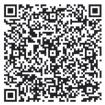
Look forward to finally having time to focus on the people and experiences that matter most to you.








At Friends Homes, maintenance and other everyday chores are taken care of, leaving you free to enjoy life. Take a class through our lifelong learning program. Go for a swim at our new wellness center. Pursue your hobbies. Explore your faith. Volunteer in the community. Or enjoy a delightful meal with friends at one of our four dining venues. Our community o ers more activities and a refreshing, whole-person approach to wellness to give you more options for an active, engaging lifestyle.
And with charming studio and one-bedroom apartments, bright villa apartments, and spacious townhomes and cottages, you’ll find the right-sized space to make you feel at home.


Join us for an upcoming event to experience life at Friends Homes firsthand and learn about the limited number of apartments available. Call or visit us online to sign up for a tour today.












As bankers for TowneBank, we have the people you need right here at our fingertips. Whether it’s your business or your family, banking, mortgage, or insurance, we are ready to help. We are here for you when you need us.

63 Ice Cream Parlor Poetry by Stephen Smith
64 Peony Passion
By Ross Howell Jr. A Reidsville attorney’s beautiful living legacy
72 A Tale of Two Fountains A Paul Billingsley fountain lands in Greensboro By Cynthia Adams
76 A Lofty Life
By Maria JohnsonWhat’s black and white and artistic all over? The barn-inspired home of Janine Wagers and Ty Pruitt

88 Almanac By Ashley Walshe
Cover Photogra Ph and Photogra Ph this Page by a my Freeman













DIAMOND
TOP 1/2 OF 1% OF THE NETWORK








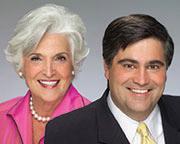










PLATINUM
TOP 1% OF THE NETWORK
GOLD
TOP 2% OF THE NETWORK



EDGE SOCIETY TOP 10% OF THE NETWORK



HONOR SOCIETY TOP 16% OF THE NETWORK













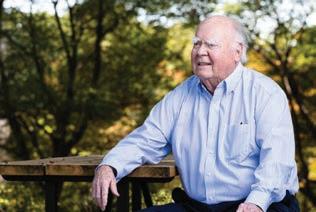
As a high school junior in Winston-Salem in 1954, Bill Baldridge played right tackle for the football team, helping win a state championship. “I wasn’t the best athlete out there but I gave it my all, and I’ll cherish those boyhood memories for as long as I live.” Today, a resident of Arbor Acres for the past 5 years, Bill cherishes living in a vibrant community that is friendly and stimulating. “The services and amenities, the beauty all around, everything is wonderful. You come here and you feel young again.”
MAGAZINE
volume 13, no. 4
“I have a fancy that every city has a voice.”
336.617.0090
111 Bain Street, Suite 324, Greensboro, NC 27406 www.ohenrymag.com
PUBLISHER
David Woronoff david@thepilot.com
Andie Rose, Creative Director andiesouthernpines@gmail.com
Cassie Bustamante, Editor cassie@ohenrymag.com
Jim Dodson, Editor at Large jwdauthor@gmail.com
Miranda Glyder, Graphic Designer
CONTRIBUTING EDITORS
Cynthia Adams, David Claude Bailey, Maria Johnson
CONTRIBUTING PHOTOGRAPHERS
Lynn Donovan, Amy Freeman, Bert VanderVeen
CONTRIBUTORS
Harry Blair, Anne Blyth, Susan Campbell, Ross Howell Jr., Billy Ingram, Gerry O’Neill, Liza Roberts, Stephen Smith, Zora Stellanova, Ashley Walshe, Amberly Glitz Weber
ADVERTISING SALES
Marty Hefner, Advertising Manager
Lisa Allen 336.210.6921 • lisa@ohenrymag.com
Amy Grove
336.456.0827 • amy@ohenrymag.com
Larice White
336.944.1749 • larice@ohenrymag.com
Brad Beard, Graphic Designer
Jennifer Bunting, Advertising Coordinator ohenrymag@ohenrymag.com
Henry Hogan, Finance Director 910.693.2497
Darlene Stark, Subscriptions & Circulation Director • 910.693.2488
OWNERS
Jack Andrews, Frank Daniels III, Lee Dirks, David Woronoff
In memoriam Frank Daniels Jr.
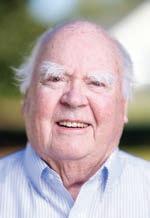
© Copyright 2023. Reproduction in whole or in part without written permission is prohibited.
O.Henry Magazine is published by The Pilot LLC

If you or a loved one requires medical equipment and supplies to live comfortably and have the best quality of life possible, look to us as your one-stop solution.
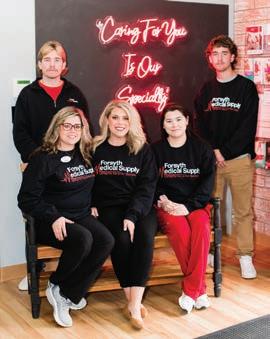







What do you take with you when you’re evacuating for a hurricane? Baby, check. Baby accoutrements, check. Both dogs, check. Toiletries, check. Enough clothes for just a few days — because surely, we won’t be gone that long — check. (Though overpacking was a nonissue since my two-week-postpartum body wasn’t squeezing into much besides drawstring sweatpants when Katrina made a beeline for New Orleans.)
After living it up for a year in an old, baby-blue, converted Victorian in New Orleans’ Garden District, Chris and I moved across Lake Pontchartrain to Slidell to begin our more “respectable,” suburban newlywed life in 2003. The Lake Village rancher was our very first home and I took much pride in making it ours.
A year-and-a-half later, I coated the walls of the soon-to-be nursery in buttery yellow and filled the space with blue-and-green furnishings from my own childhood. And, much to my current self’s embarrassment, I decorated with a frog prince theme. Royal amphibians in place, we were as ready as we’d ever be. In August of 2005, we welcomed our first baby, a boy, into our home.
As if being frazzled new parents isn’t enough of a sleepless whirlwind, an actual cyclone had just announced its impending arrival. Lucky for us, my dad was visiting. His timing couldn’t have been better because it turned out that we needed him. Since I wasn’t yet allowed to lift anything heavy, Dad and Chris boarded up the windows of our rancher.
Together, we hurriedly packed up all the essentials and loaded everything into our two cars. Chris drove his Jeep Liberty, our two pups panting anxiously in his ear, and Dad took the driver’s seat of my Ford Escape, with 2-week-old Sawyer and me riding



in the back. One by one, we joined the slow-moving interstate parade of evacuees. Because I was still nursing every couple of hours, highway truckers — who had a straight line of sight into our car — got quite a show. Helpless, I simply waved and smiled as we passed them.
Our hours-long drive finally landed us in Knoxville, Tennessee, home to my in-laws who welcomed the four of us, plus our canines, to crash their house for what we’d wrongly assumed would be just a few days. My mother-in-law, Pam, raved about how I was holding it all together, especially as a new mom in crisis. Honestly, I didn’t know to do any differently. What else could we do but accept things as they were and keep putting one foot in front of the other?
But, eventually, my breakdown came. We watched the news relentlessly to find out the latest at home. All of our friends had evacuated as well, so no one was there to fill us in except for reporters who tend to exaggerate. The tears finally fell when an anchorwoman said, “Eighty-five percent of homes in Slidell have been destroyed.” At that moment, it finally occurred to me that we may not have a house to return to.
Noticing my wet eyes, Chris put his arm around me reassuringly. I looked around and took in my surroundings. Baby asleep in hand-me-down Moses basket, check. Partner by my side, check. Dogs sitting at my feet, check. In short, we were lucky to all be alive.
In the coming week, though, we’d learn just how lucky we were. Aside from needing a new roof, our house, which sat less than a mile from where flooding reached, survived. But that experience redefined what home means to me. It’s not a building filled with precious things you’ve put on walls and collected over the years. It’s a feeling of safety and security, a knowing that everything you need is within reach and that your family will be by your side throughout any storm. That is home. OH






And, Alamance County is the perfect place to do it. Experience the return of our annual Burlington Carousel Festival on May 6 & 7, 2023 at Burlington City Park. Enjoy riding on one of the restored 46 hand-carved wooden animals on the Carousel. Gather with friends and family to enjoy live music, handmade artisans from across our state and great food.

Additional Event Dates:

35th Annual Mebane Dogwood Festival
Saturday, April 22, 2023
Vintage Revival Spring Market
Saturday, May 13, 2023
You’ll find small surprises lead to big memories in Alamance County.
We were, in fact, eating some freshly-picked, beautiful, blue-green Lacinato kale, aka dinosaur kale. My dining partners were impressed, but what they didn’t know, and soon learned, was how runty our plants were. “You should have ordered the Walking Stick kale,” says my wife, Anne, grabbing our dog-eared copy of the Baker Creek Heirloom Seeds catalogue. There, pictured in the kale section, was a gray-whiskered gardener atop a teetering ladder, plucking kale from a 20-foot-high stalk.

It’s that time of year when brown grass gets browner every day while multicolor splashes of brilliant Pippin’s Golden Honey peppers, Kyoto Red carrots and kaleidoscopic Glass Gem popping corn jump right off the catalogue pages into our imagination. “I planted Glass Gem popcorn and the ears were the size of your thumb,” one dinner guest says. And we’re off, all of us digging up dirt on seeds that have let us down by only sprouting disappointment: the oh-so-challenging ramp and garlic seeds; the Dutchman’s pipe seeds, terribly
expensive and requiring three months of refrigeration and six months’ germination — before dying; the Amazing Grey Poppies that did anything but amaze; caper seeds; miner’s lettuce and even pine nut seeds. “How much of it is our trying to grow something that’s never meant to thrive in our soil and climate?” another dinner guest wonders. “Probably, but I feel so betrayed when I compare my plants to the ones in the catalogue. Worse yet, I feel like such a bad gardener,” Anne admits. “Does that mean you decided not to buy the package of 1,500-Year-Old Cave Beans?” I wonder. “They’re already in the mail,” Anne says.
—
David Claude Bailey
"A spirited forum of Gate City food, drink, history, art, events, rumors and eccentrics worthy of our famous namesake"
"Gimme all your eggs and nobody gets hurt."PHOTOGRAPH © CAROL W. MARTIN/GREENSBORO HISTORY MUSEUM COLLECTION
There are countless stories of wayward souls saved by Jesus Christ. But did I ever tell you the story of how this irredeemable sinner rescued Jesus?
Cinematographer Philip Dann retrieved this magnificent depiction of one of the stations of the cross from a construction dumpster. There were originally 14 of these detailed monuments — this one being the ninth station, divinely depicting Christ’s suffering at the hands of Roman soldiers.

Dating back to the 1930s, it weighed about 60 pounds and was sculpted in painted plaster mounted on a solid wood backing. Sadly, only three of the stations survived. It seems an old church along the Carolina coast that was modernizing and renovating felt these magnificent dioramas were too old fashioned — so they just chucked them, most reduced to rubble. Can you imagine?!?
Artist Steisha Pintado, whose work can be seen as part of the Weatherspoon Art Museum’s 2023 UNCG MFA Thesis Exhibition, recalls her childhood as one of “isolation, guilt and fear.” After years of feeling as if her life was “predetermined and designed around being a Jehovah’s Witness,” Pintando left the church and now explores her narrative through her interdisciplinary work, including drawing, painting, puppetry and animation. The Fruit of Goodness, a multimedia acrylic-and-fabric on paper, is about Pintado’s coming to terms with realizing that the paradise that was promised to her as a child is fictional. The colors in this particular piece were informed by childhood nostalgia and amplified by films such as Charlie and the Chocolate Factory and The Wizard of Oz in which the palettes are “sickeningly sweet” while sinister forces lurk underneath. Now using her voice and art as expression, Pintado says, “I make this work for myself, for others who have also had these experiences and to create a public awareness around these issues.” The MFA exhibit opens April 22. Info: weatherspoonart.org/exhibition-2023-mfa.

Philip pulled the three less severely damaged sculptures out of their ignominious resting place and gave them a brief cameo in a 2012 motion picture I performed in, Lake of Fire.
On the last day of filming I was asked to take those three sculptures home since they had no place to reside. Of course, I said no. I mean, these things were huge and would dominate any space, plunging a room's Feng Shui into total turmoil!
After a moment of reflection I realized I couldn't let something so unique and symbolic end up on Storage Wars. Or worse in some frat house, converted into a beer bong. So I rescued the most dramatic depiction, which now sits in my Time Tunnelesque hallway, serving as a nifty conversation starter.
It’s that time of year when wedding season is almost upon us, and that means photos that will last a lifetime. Let Restoration MedSpa get you ready for this year’s events with the very best aesthetic treatments like HydraFacial ® MD, oxygen facials, dermaplaning, chemical peels, and much more. Attend your next event with great looking skin, confidence, and style. Or make plans for the entire wedding party.


Call today for your complimentary consultation and find out how Trilift can uncover a more youthful appearance in your face.


Unless your bunny is highfalutin, it’s likely that your yard will be filled with nothing but rabbit, um, pellets on Easter morning. We came up with some alternative solutions that the E.B. can stash in your gardens. Painted rocks. Who doesn’t love a colorful stone, especially with a motivational “You rock” message? And Easter Rocks-travaganza has a nice little ring to it. Better yet, don’t paint them. Don’t even hide them. Tell the kids the bunny hid rocks and watch them go to town with nature’s bounty.

Socks. So that’s where all the missing socks are. You can even use that hopeful easter egg dyeing kit you bought in January to color them in spring pastels. They pair perfectly with Crocs.
Peeps. Trust us. No one wants those sugar-coated marshmallow fluffsters in their baskets. Don’t worry — none of God’s creatures are interested in munching on them either, so they’ll be safe. And you can likely find them for free. In your pantry, untouched from last year.
May 4 | The Tams
May 18 | The Catalinas
June 1 | The Band of Oz
June 15 | Part Time Party Time Band
June 29 | Chairman of the Board
details online!

M E E T O U R T E A M




Dr Mann is our newest team member at GPH She specializes in male/female pelvic floor dysfunction, bowel & bladder leakage, constipation, post surgical reconstruction, osteoporosis, and back pain She provides holistic, integrative care using Pilates, Yoga, health coaching as well as rehab ultrasound




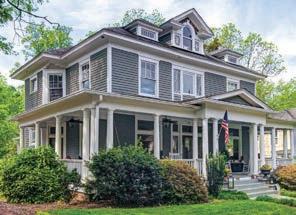












I hear a voice and look up. The face is much older, the voice deeper. But both are so familiar.
“Hey, Coach,” says Peter Gay, giving me what I used to call his sly fastball grin.
I stand up and we hug.
“You grew up, buddy.”
“And you grew old, Coach.”
“Funny how that happens.”
We both laugh.
Forty years ago, Pete and his brothers, Fred and Rodney, and their friend, Alvin, were the invincible infield of an innercity baseball team I coached for two spring seasons called the Highland Park Orioles. I nicknamed them the Birds of Paradise because most of the players came from a tough inner city neighborhood where, by agreement with their anxious parents and guardians, I dropped them off near a street named Paradise after every practice and game.
Atlanta, in those years, was anything but a paradise. Due to the infamous “Missing and Murdered” crisis that besieged the city between 1979 and 1981, in which 30 Black kids and young adults were abducted and murdered by an unknown person or persons, the city that declared itself “too busy to hate” earned the distinction of being the “Murder Capital of America” for several years running.
Looking back, going out at my editor’s suggestion to write a sweet little feature story about the hopefulness of spring baseball tryouts in my Midtown neighborhood and getting strong-armed by a frantic league director to take on a wild bunch of Orioles whose coach never bothered to show up was one of the most fortunate things that ever happened to me.
In the spring of 1982, I was the senior writer of the Atlanta Journal-Constitution Sunday Magazine, the oldest Sunday magazine in the nation, where Margaret Mitchell worked when she wrote Gone with the Wind. During my six years there, I’d written about everything from unrepentant Klansmen to corrupt politicians, presidential campaigns to repo kings, a constant stream of


violence and social mayhem.
Upon reaching age 30, I decided that I was rapidly becoming a career burn out case. In a nutshell, I’d had enough of covering the sorrows of my native South.


An early tipping point came while working on a story about Atlanta’s famed medical examiner, Dr. Robert Stivers — reportedly the inspiration for the hit TV show, Quincy — when I actually saw my next-door neighbor, a med student, gunned down in his darkened backyard doorway by an assailant. The young man died as his hysterical girlfriend and I waited for the EMTs and cops to arrive. The cops took their own sweet time, shrugging it off as just another drug deal gone sideways. I followed the ambulance hauling my neighbor’s body downtown to the ME’s office to await his autopsy. Talk about art imitating life’s worst moments.
My editor, a charming true-blue Atlantan named Andy Sparks, who’d been on the magazine since the days of Margaret Mitchell, had spotted my brewing crisis and suggested I write about “lighter” subjects for a time. So I went over to the rutted ball field with pen and pad and not a lot of hope in hand.
Our first practice was chaos. The team horsed around and barely paid attention as I placed them into tentative playing positions. Somehow, I managed to get the four best players into key spots. Pete and Alvin would rotate between pitching and playing third; Fred at first base, and Rodney catching.
On the way home, I stopped at a popular neighborhood joint called Woody’s just two blocks from the ball field, foolishly thinking that if I bought them a milkshake and got to know them better, the four best players on the team might help me whip the Birds into shape. Instead, they hooted and hollered and made such a rude ruckus that the owners tossed us out and warned us not to come back unless we could learn to behave.

“I remember how you gave us a lecture about being gentlemen in public places,” Pete says as we sit together at Woody’s 40 years later. The place is now owned by a Black couple. Its milkshakes and steak-and-cheese sandwiches are better than ever.
Peter Gay is 53 today, a hard-working father of three grown

children, and a popular volunteer football coach and recruiter for Booker T. Washington High in the center city. He’s dressed in the bright blue colors of the Washington Bulldogs.
Two years ago, he called me out of the Bulldog blue.
“I remembered the story you wrote for the Reader’s Digest about us,” he explained on the phone that afternoon. “And I remembered that you left Atlanta to write books. That’s how I found you on the internet.”
“Tell me,” I said. “Is Woody’s still there?”
A day later, Pete sent me a photo of himself in front of the Woody’s sign. We made a plan to meet there when I came to Atlanta for my latest book research.
That first season, the Birds of Paradise never lost a game. Or if we did, I don’t recall it. We often won by football scores. Pete had a lethal fast ball. Alvin’s curve was unhittable. Rodney was an awesome catcher and Fred played first base like a pro. Even better, the Birds calmed down and became true gentlemen on and off the field, though I spent a small fortune on milkshakes once the other members of the team learned about my gambit and got in on the post-game treat.
“You kind of bribed us to behave with milkshakes,” says Coach Pete Gay today. “But I get that now. It really worked.”
Because of the Birds, I stayed for one more spring in Atlanta. In year two we went undefeated. A coach from the all-White
northern suburbs even proposed a “Metro” championship game at his team’s immaculate facility north of the city. We set a date for the game, and I went out and purchased new orange jerseys with my own money. A few days before the match-up, however, my opposing coach called back to say that some of his parents were concerned that my kids might feel “intimidated about playing in such a nice facility.”
I assured him the Birds wouldn’t be intimidated. We both knew the meaning of his code words.
“Well,” he said uneasily, “maybe . . . next year.”
There was no next year.
After the season, the owners of Woody’s threw us a party and I left Atlanta for Vermont, where I learned to fly-fish, knocked the rust off my golf game and found a whole new career — and happiness — writing about people and subjects that enrich life.
I also realized that the Birds of Paradise gave me a gift those final two years — a healing glimpse of what real happiness is like.

As another spring dawns, I’ve seen Pete and Fred several times and even attended the beautiful wedding of Pete’s daughter, Petera, last summer. Very soon, on my next trip to Atlanta, I’m planning to take my entire infield to a very nice, grown-up dinner, with or without milkshakes. OH
Jim Dodson is the founding editor of O.Henry




(March 21 – April 19)
Life gives us what we need even if we don’t have the RAM to ask for it. In your case: lessons in patience. While you’ve been through the wringer this year in more ways than one, trust that it’s not been in vain. The big picture begins to clarify this month — you’ll see — and when Jupiter enters your sign on April 22, it may well inspire some monetary gain. Things are looking up. Never mind that you’ve got a spending habit to match your fiery temper.
Taurus (April 20 – May 20)
Cash in your chips.

Gemini (May 21 – June 20)
Beware of the Freudian slip.

Cancer (June 21 – July 22) Open a window.

Leo (July 23 – August 22)
Embrace the liminal space.
Virgo (August 23 – September 22)
Two words: Tupperware upgrade.


Libra (September 23 – October 22) Keep a light on for grace.
Scorpio (October 23 – November 21)

The silence will tell you everything.
Sagittarius (November 22 – December 21)
Mind where the roots run deep.
Capricorn (December 22 – January 19)
Loosen your grip.
Aquarius (January 20 – February 18)
The tension is palpable.
Pisces (February 19 – March 20)
Consider a digital detox. OH
Zora Stellanova has been divining with tea leaves since Game of Thrones’ Starbucks cup mishap of 2019. While she’s not exactly a medium, she’s far from average. She lives in the N.C. foothills with her Sphynx cat, Lyla.

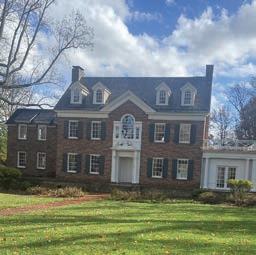
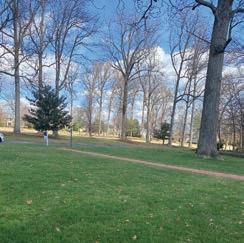







landed in my inbox a few days apart.
The authors — who didn’t know each other — had read my February column about riding in the Oscar Mayer Wienermobile (www.o.henrymag.com/lifes-funny-76/) and wanted to know if I’d run across any mention of “Little Oscar, The World’s Smallest Chef.”
Bob Sandberg, who lives in Colfax, wrote that while growing up in Madison, Wisconsin — the headquarters of Oscar Mayer — he’d encountered the wiener-on-wheels several times, and that “Little Oscar was a huge draw wherever the Wienermobile went. He was this ‘little person’ dressed in a white chef’s jackets and slacks and a white chef’s toque. He would mingle with the crowd and hand out the Wienermobile whistles.”
No, indeed, I had not heard about Little Oscar, but I was happy to add this to my stash of wiener trivia.
Then came an email from Diana Wold of Browns Summit, also by way of Wisconsin. She, too, wanted to talk about Little Oscar.
At this point, I’m thinking “What’s up with Little Oscar?” But I’m glad Diana reached out because I learned some juicy facts.
One: Little Oscar’s real name was Meinhardt Raabe (pronounced Robbie), and he was her second cousin, her father’s cousin’s child.
And two: Raabe’s bigger claim to fame was his role as the Munchkin coroner who pronounces the Wicked Witch of the East dead in The Wizard of Oz movie.

Whoa.
It’s a globally recognized scene in which Raabe — in a bright orange wig, waxed beard and mustache, along with a dark purple cape and huge hat with tightly curled brim — stands beside Dorothy and unfurls a Certificate of Death. (Heʼs the third from
the left in the poster pictured.)
He then warbles this 13-second line in front of the Mayor of Munchkinland:
As coroner, I must aver I thoroughly examined her And she’s not only merely dead
She’s really most sincerely dead
His announcement sets off the Munchkins, who break into jubilant song — “Ding, dong, the witch is dead . . . ” — which gets the attention of the squashed hag’s sibling, the Wicked Witch of the West, who appears in a puff of red smoke.
“Who killed my sister?” WWW demands.
Game on.
My heart leapt to know about the Greensboro connection to this classic snippet of moviedom, and I made a beeline to Diana’s kitchen, where she and her husband Russ shared stories and documents that told more about their esteemed cuz of Oz.
Born to German immigrants in 1915, Raabe grew up on a dairy farm in Watertown, Wisconsin. He was the only little person in his family — indeed, in the whole area — something he was painfully aware of.
“He wanted to be a minister, but the story went back then that he was not tall enough to see out of the pulpit,” says Diana.
So Raabe went to a local college to study accounting. In the summer of 1933, his parents took him to the World’s Fair in Chicago. They’d heard about Midget Village, a scaled-down replica of a German town populated by small adults.
It was a life-changing experience, Raabe told interviewers, to see people like himself. They lived, worked and played together. He’d found a community.
He worked at Midget Village the following summer and used his earnings to help pay for school. He finished his accounting degree at the University of Wisconsin in Madison and looked for white-collar work. He was 3-foot-4.
“The accounting companies couldn’t see me for dust. Prejudice was very outspoken at that time,” he told the Lutheran magazine, Correspondent, in 1992. One manager suggested that he work in a carnival sideshow.
Raabe finally landed a job with Oscar Mayer. Soon afterward, in 1936, the company christened the first Wienermobile, a novelty car for promotional appearances.
Years later, Raabe suggested to an interviewer that he’d come up with the idea for Little Oscar after noticing a small chef pictured on the company’s packaging.
“I said, ‘Well, look, I can be a little chef and a sales promotion person,’” he told Correspondent. “I could speak fluent German and probably 70 percent of their customers at that time were butchers of German parentage.”
Raabe suited up for the part-time Wienermobile gig in addition to his sales job.
In 1938, he heard about a little-people casting call for an MGM movie. He hopped a train to California and auditioned. His speaking ability landed him the part of coroner in The Wizard of Oz. He took a leave of absence from one cultural touchstone to work on another.
When the film wrapped, Raabe, then 23, went back to the Wienermobile. Wizard was released in 1939. Gone with the Wind hit big screens the same year, and Wizard lingered in the shadow of the Civil War blockbuster until television boosted its profile.
Even as a child in the 1940s, Diana Wold says no one in her family talked about Raabe being in the Wizard. He was celebrated as Little Oscar. It wasn’t until Wold became an adult that she realized the movie’s status.
When she and Russ lived in Appleton, Wisconsin, a neighbor found out that Raabe was Diana’s relative. He was overjoyed to meet the one-time actor.
“So help me, I thought he was going to wet his pants,” says Diana, now 80. “People are like that about The Wizard of Oz.”
The Blockade Runner Beach Resort offers the only oceanfront gardens in Wrightsville Beach. Lush and expansive lawns are a stage for breathtaking sunrises, seasonal blooms, fun-filled games and sports, relaxing lounge areas, drinks around the firepit, and more. Every season is unique in our gardens.

(855) 416-9086
blockade-runner.com


Yep. The movie has so many rabid devotees that Raabe and his wife Marie — also a small person whom Raabe met when he was traveling with the Wienermobile and she was working as a cigarette girl in an Akron, Ohio, hotel — traveled the country attending Ozrelated events after his retirement from Oscar Mayer in 1971.
Raabe, who continued growing to 4-foot-7 after the movie, relished mingling with fans, signing autographs and repeating his lines from the movie, even though it was later revealed that his speaking part, and those of other Munchkins, were altered and dubbed.
“It’s been a lifetime means of making a living,” Raabe once said. “You can’t get sick of something that keeps you going.”
At times, he still felt the sting of disrespect — he reported that people fronted him in lines and reached over his head to grab items in stores — but he also understood that his stature was key to his security.
After the Wolds moved to Greensboro in 1994, Raabe and his wife drove their custom RV to visit the couple several times, usually between fanfests.
Our clients trust that we’ll help them pursue tomorrow’s financial goals — whether it’s a comfortable retirement, funding a child’s education, the long-term success of your own business, or even the pleasures of travel and leisure you’ve always promised yourself.











“Meinhardt could talk about anything,” Russ recalls.
“A mile a minute,” says Diana.
“He could talk your arm off,” Russ adds. “He seemed like he was in his teacher mode a lot of the time.”
Raabe, also a pilot, taught navigation and meteorology as a member of the Civil Air Patrol in World War II. He earned a master’s degree in accounting and studied horticulture. He liked to walk around people’s yards, identifying plants and giving instructions on how to care for them.
“He was going to tell you what he knew,” says Diana, laughing.
Retired to a senior community in Florida, Raabe continued traveling after his wife died of injuries from a car wreck that hurt both of them in 1997.
He came to Greensboro in 2001, at age 86, to attend the Community Theatre of Greensboro’s seventh annual stage production of Wizard, a local tradition.
He recalled his time on the movie set to Cathy Gant Hill of the Greensboro News & Record.
Judy Garland, he said, was not quite 16, but sophisticated for her age.
“She’d come in the morning and say, ‘Hi, gang!’ We got the impression she enjoyed working with 124 little people as much as we did with her,” he said.
Raabe kept going.
He appeared on Jimmy Kimmel Live! in 2005, the year he released his autobiography, Munchkin Memories.
In 2007, he attended the unveiling of the Munchkins’ star on the Hollywood Walk of Fame.
In 2009, he was featured on NPR’s Weekend Edition Saturday.

“He enjoyed the limelight,” says Russ Wold.
Raabe died in Florida in 2010. He was 94. He and his wife had no children. His estate gave $1 million to Bethesda Lutheran Communities, an organization based in his hometown. He had previously given the outfit $3.5 million. Now known as AbleLight, the nonprofit helps people with intellectual and developmental disabilities.
“Because he experienced discrimination based on his appearance and perceived ability . . . he gave with an open hand and an open heart,” the organization’s annual report said in 2015.
Sitting in her kitchen, Diana Wold shakes her head in amazement.
“He had quite a life, with the Wienermobile and The Wizard of Oz, and everything in between,” she says. “He’s my claim to fame.” OH
at ohenrymaria@gmail.com.

At Doctors Hearing Care, better hearing is always our focus. Dr. Amy Kirkland, Au.D. and Dr. Melissa Westall, Au.D. are committed to provide each patient with an exceptional level of care and attention. Together, they have been the triad’s leaders in hearing technology for over 28 years.







Lee Smith, a treasure of the North Carolina literary world, takes you on an unusual journey in her newest novel, Silver Alert. She’s predictably funny in her typically marvelous, unpredictable way. Her characters are beguilingly quirky. Yet amid all the humor and occasional madness in this tale about an octogenarian’s “one last joyride,” Smith plunges her readers into the depths of tough topics such as aging, sex trafficking, emotional abuse, poverty and wealth.

There are two protagonists. One is Herb Atlas, a curmudgeonly but ever so lovable retiree on his third marriage who we meet in his lovely — and very pink — Key West home. In his golden years now, Herb is perpetually mining for the gold he really didn’t know he had in his youth as he does his best to care for his once lively, artistic, adventurous and beautiful wife, Susan. He longs for the fancy and fast cars of his earlier years, alluring courtships and an escape from the dementia that has relegated Susan to a rattan chair by the bay window, where she remains lost in her own world.
The other central character, Dee Dee, or Renee, or whatever name the victimized but optimistic woman from Appalachia decides to use, is a young pedicurist fleeing hard-knock days. She is whip-smart, resourceful and endearing. Her parents died when she was a child. She bounced from household-tohousehold, man-to-man, lives in a bread-shaped trailer with a pink roof and fends for herself in a world in which those she encountered rarely had her best interest at heart.
Dee Dee is running from her past with hopes of a brighter future. Herb wants little to do with his future and yearns for the
past. Their paths converge in Key West, a place with celebrated sunsets and a seize-theday vibe.
Key West is a character in the novel, too. Smith takes her readers down Duval Street and its offshoots, into shops, cafes, Laundromats, and the nooks and crannies where people come to remake themselves, start anew or sometimes disappear.
Herb is in his home at 108 Washington Street, “a primo address,” as Smith describes it, wearing red-and-black plaid pajama pants, lime green crocs and a Hawaiian shirt covering his considerable gut, when he opens the door, and his life, to Dee Dee.
Using Renee, instead of her real name, Dee Dee has come to give Susan a pedicure. “She looks like a kid, with those wide brown eyes beneath the blond bangs, her high, shiny ponytail swinging as she steps forward in her white, white tennis shoes,” Herb thinks to himself. He gives her an earful as he walks her back to his wife’s quarters. Susan’s daughter, Maribeth, “the hippy one,” as Herb calls her, and her partner Pat DeVine, “the bossy one,” who arranged the appointment, have come down to help care for his wife.
Herb is unenthusiastic. “I never asked them, you understand. I don’t need them, this is a classy operation. But this Pat, you can’t tell her no, you can’t tell her nothing.”
Dee Dee, dressed in jeans, a pink tunic and carrying a big bag of nail polishes, clippers and salon tools, is not just a pedicurist, it turns out. She has a knack for dealing with Susan. The “crazy whisperer,” as Herb dubs her, can make his Susan laugh, smile and even seem happy with colorful markers, a tablet and easel from the Walmart children’s section. For hours at a time, Susan sits in the garden in front of her easel, using only one color on each sheet of paper, drawing “crazy art.”
The makeshift art corner delights Herb as he tries to ignore the signs of aging thrust at him — the living wills, the health care power of attorney, confounding medical forms and that humiliating clock he had to draw for the nurse, showing the hands set at 7:15, to assess his mental acuity. Then there’s his constant urge

to pee — “Old age is all about urine, who knew?” Smith writes.
Smith takes on some of the difficult topics of aging as she introduces her readers to the cast of adult children in Susan and Herb’s world. She shows the push and pull, and the sometimes painful juxtaposition, as children take on the difficult roles of being parents for their parents.
Smith craftily explores the wealth dichotomy so prominent in Key West as readers follow Dee Dee, whose hardscrabble beginnings have left her with few nickels to scrape together. Her travels take her from the trailer park where drug trafficking sometimes pays the rent to the affluence of the Atlas house and the “tree house,” where she has a romance with a well-to-do graduate student taking a break from his scripted life to live like a Bohemian and write poetry.
Herb and Dee Dee go about their business for much of the first half of the book at a pace that — like a child chomping at the bit to grow up — is not always as swift as desired.
Then Herb and Susan’s family stages an intervention and they can see their dreams unraveling. As the adult children talk about moving Herb into an assisted living facility in Del Ray with Susan, he fishes keys to his Porsche from his secret hiding place in a shoe and sets off with Dee Dee on a madcap adventure.
Our

Herb’s last joyride is a joy for readers, as well. Even though there are cringing moments as the pair starts out along the streets of Key West, then on the highways north, eventually headed to Disney World, it’s difficult not to cheer them on.
Silver Alert will make you squirm over the wistfulness of aging, but it will leave you with a big smile from getting to know characters who worm their way into your heart. OH
Anne Blythe has been a reporter in North Carolina for more than three decades. She has covered city halls, higher education, the courts, crime, hurricanes, ice storms, droughts, floods, college sports, health care and many wonderful characters who make this state such an interesting place.
mission is to exceed your expectations of what great dental care can be. Our team and practice is rooted in our core values of compassion, integrity, and expertise.












The reclusive Mel Chin creates deeply engaging artwork at an international scale
 By liz A RoBeRts
By liz A RoBeRts
The only visual artist in North Carolina ever to win a MacArthur Genius award, Mel Chin manages to hide in plain sight in his home state, where only the most art-informed even know he’s here.
Tucked into Higgins, N.C., a distant corner of Yancey County near the Tennessee border, this world-renowned artist has space and time for his creativity to expand and his engagement with the wider world to ignite. His massive public sculpture, augmented-reality, subversive video, collage and interactive installations address issues as wide-ranging as climate change, political division, the environment, community health and the Black Lives Matter movement.
Chin says his conceptual work is a tool for civic engagement and a way to raise awareness of social issues. Through art, he believes questions can be asked and possibilities raised in uniquely effective ways. “I have always described the practice of art as providing an option, as opposed to an answer,” he says, sitting back in the shade of a porch at his stone house. Ivy and overgrown shrubs blur its edges as the Cane River rushes nearby.
He was here in 2019 when the MacArthur people called to tell him of his remarkable award, including its no-strings-attached check for $650,000. Chin “is redefining the parameters of contemporary art and challenging assumptions about the forms it can take, the issues it can address, and the settings it can inhabit,” the Foundation said in announcing its decision.

“When people ask about what inspires you,” Chin says, “I no longer speak in terms of inspiration, but of being compelled. Because how could you not?” The issues that compel him are not necessarily new, he points out, but they’re in the news, which provides new opportunities.

Remote as he is, much of Chin’s work is done in collaboration with others, near and far. His 60-foot-tall animatronic sculpture Wake, which resembles both a shipwreck and a whale skeleton, was created with University of North Carolina Asheville students and was installed in Asheville’s South Slope after forming the focal point of a larger installation in Manhattan’s Times Square. There it was accompanied by Unmoored, a mixed-reality mobile app he designed with Microsoft that depicted the square as if it were 26 feet under water, submerged by rising sea levels. It was one of several installations in a New York City-wide survey of Chin’s works in 2018.
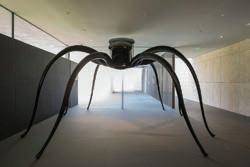
The creative expression of scientific information and the use of technology to inspire empathy is a Chin hallmark. One ongoing project uses plants to remediate toxic metals from the soil; a Mint Museum installation used oceanographic data to create “cinematic portraits” of the Atlantic and Pacific Oceans; and a viral, community-based work circulates hand-drawn hundred dollar bills to draw attention to lead contamination in soil, water and housing. “You could say that I’m involved with the process of bridging science and community,” he says.
Community in the traditional sense seems far removed from his remote corner of the world, but Chin’s dogged social conscience, regular travel, wide network and the connected reality of 21st-century life keep him plugged in. He’s




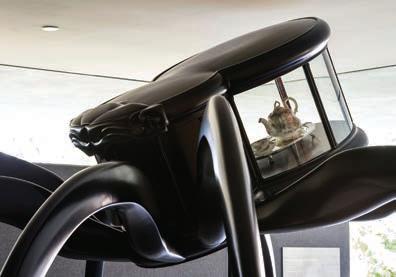
turned the stately 1931 stone mansion at the center of his compound into a rambling archive and workshop for his many artistic pursuits. The mansion was originally built as a library and community center for the creation and distribution of local crafts. It became part of a regional study on poverty and was visited in 1934 by Eleanor Roosevelt; it also served as a school and was used as a birthing hospital. The place had fallen into disuse and disrepair when Chin acquired it in the late 1990s as an inexpensive place to store his work. A few years later, he left New York, where he had lived for many years, and moved here himself — not into the mansion, but into the relatively modest house a few feet away, one originally built for the hospital’s chief doctor.
Chin says he was drawn to this part of the country not just for space and the chance to live deeply within the natural world, but also by the region’s history of racial injustice and his own lifelong commitment to fighting it. The American-born child of Chinese immigrant parents, Chin grew up in Houston in the 1950s,



worked at his parents’ grocery store in the city’s predominantly African-American Fifth Ward, and became aware of and thoughtful about issues surrounding race from an early age.
“To be engaged in the world,” he says, “it’s OK to be in places where the engagement is very real and uncomfortable.” Lately, that engagement transcends geography. “It’s an important time,” Chin says. “We’re at this bridge. It’s about consolidating a commitment to actually begin again, listen more and reorient actions, and respond.” The role of an artist, he says, is to “excavate” the questions such issues provoke, provide a starting point and draw collective attention. Still, Chin points out that from his perspective, the “job description of artist” is constantly evolving: “People think it’s kind of funny when I say that I’m still trying to be one, to be an artist. But I mean it, actually.” OH

Last fall, we asked our readers to submit essays under 1,000 words that captured a year that changed the course of their lives. Our inbox was pleasantly stuffed with heartfelt stories from our community. There were stories of loss and grief, war, and devastating diagnoses. And there were tales of triumphing over cancer, adopting new pets, holding the winning tickets and attending first concerts — featuring no less than the Beatles!
Every single entry made us feel something. We laughed, we grieved, we cried right along with our essayists. And then we cried again when we had to choose just three from such a stellar collection.
To all who entered, thank you. We do not take for granted that you shared your stories bravely — and so eloquently — with us. And to all who didn’t enter, we’ll be looking forward to reading your story next time. And finally, to our winners, congratulations!
O.Henry editorial team —Our hands cupped around glasses of red wine, a candle flickers, almost in cadence with our short spurts of words. We sit, bereft, until the pause becomes pregnant with another offering. My friend, Susan, looks at me, right above the candle flame and says, “Now, what are you going to do with your hands?”
I glance at my wife, Cathy, still focused on her glass of wine, empty? Needs filling, maybe she isn’t listening. She drifts away. Often.
I stare at Susan, a frown on my face, waiting to hear more words. “What ever does she mean?” I wonder. “Hands?”

Through the evening we have been listening to Leonard Cohen. Especially “Suzanne,” these long, lonely days I am in free fall, “Suzanne takes you down.” I get it. In that moment, the three of us begin weeping. That question going way below the surface of our lives, spiraling down.
Robin is seated on the side of her hospital bed. Her left arm has an IV attached to it; her feet are stretched out. A man sitting on a stool is leaning down and
painting her toenails. Robin giggles. “Wait a minute,” I say to myself. “It’s Charlie Schafer, her pediatrician.” His hands gently, slowly paint each toenail. It’s October 27, Robin’s birthday. She has been admitted to UNC Hospital and we have just been told that tomorrow we should take Robin home. “Nothing more we can do for her here; take her home and just love her,” the attending physician speaks low, glancing to his right, then left, like he wants to be somewhere else.
one wild and precious life?”
Sitting at that wheel, wedging that clay. Mesmerized by the turning of the wheel, the mystery of form emerging from a chunk of earth. When sorrow overwhelmed and sadness took me way down, Thursday nights arrived with a little Stan Getz and his saxophone in the background. I would tie my apron. Sit down, cup my hands, and the journey into the unknown would begin.
We clung to an elusive hope. Robin was diagnosed with cystic fibrosis when she was 2. We were taught to do a light, steady “tapping” — three and often four times a day — percussive-like, with cupped hands on each lobe of her lungs. We named it, “time for tat.”
We were told this would keep her alive. Longer. The goal of “tat” was to loosen up the phlegm in her lungs so she would cough and cough, staving off pneumonia. Coughing hurt Robin and she resisted and tried to hide a cough. A double bind for us. Tapping on the lobes of her lungs hurt her and yet, to keep her alive, we had to hurt her.
On Christmas Day we stopped tat. Her mother and I looked at each other and we stood there, quiet, allowing Robin to sleep in.
In the midst of the celebration of the United States Bicentennial Year early in the morning of Martin Luther King Day, Robin woke us up at 5 a.m. I picked her up and checked her fingers, blue. Her breathing slow, faint. I went to her mother, “Better come into Robin’s room.” We held her, smothered her with kisses and prayed that her journey home would be without pain.
What was I going to do with my one wild and precious life, when I couldn’t keep alive a life, so precious, that was given to me? Wander. Pay attention to longings and yearnings. So I did. Bought an abandoned farm on a river, down a long gravel road, an hour from Chapel Hill.
Many years later, I took dance classes at Harvard, separated from my wife, moved onto a sailboat in San Francisco Bay. Started up a big rambling home for HIV folks in Asheville with my beloved. Still through all this grief and searching, I kept my hands in clay.
It’s the first weekend in December and I am sitting on a stool in the parking lot of High Point Library. It’s a craft fair for those wanting handmade art for Christmas presents. Although a bit nippy, I am wedging clay, throwing it down on the wheel to begin centering and pulling up. A family of five is watching me, the two youngest children held by the mother. The older one and the father are intent on the movement of my palm and fingers . . . a cup slowly emerges.
Susan takes another sip of her wine and asks again: “So what are you going to do with your hands?” She pauses, holds the wine glass in both hands: “I have signed up for a pottery class, a week after Easter. At Meredith. 6 – 8 p.m., Thursdays. I want you to come with me.”
In my mind I am reviewing my life: “B.A. in economics. M.B.A. in marketing, an advanced degree in theology and she wants me to sign up for an art class!”
Thursday night. There is a porch. Four kilns. Susan and I walk into the white cottage. A shaggy guy, tall and bulky with a winsome smile on his face speaks: “Welcome, I’m John. John Givens. This is a beginning pottery class. Take a seat at the wheel, any wheel.”
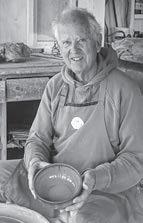
What do you do when your child dies in your arms? When you have been helpless in stopping the pain? Emptied out of any hope and meaning? An avid reader of poetry, Mary Oliver continues to ask of me, “What are you going to do with your
The dad looks at me as I take a short break to breathe a little more deeply and to inspect how this pot is coming along. He asks, “I love watching your hands and what you can do on that wheel, how did you get into pottery? What got you going?” OH
McCabe Coolidge wants to live fully with these passions: surrounded by love from his sweetheart and three daughters; and with his hands in clay, pen on paper, paddle in water, feet celebrating Tracy Chapman singing “Give Me One Reason” and Leonard Cohen singing “Suzanne.”



It all started in 1995 with an Alanis Morissette cassette tape and a few outdated dELiA*s catalogs. We were two seventh grade girls in a small, Bible Belt town dreaming of becoming writers and finding cute boys who really “understood” us. The year that changed everything was the year I found a true friend.
Not to harp on a truth that any feeling human already knows, but middle school is vicious. While I was figuring out what parts of the world felt authentic to me, I also experienced rejection for many of those very same things, and, in the beginning, I found it to be a lonely time.
So, I don’t remember exactly how it happened, but I think it involved a homeroom class turned free-for-all where there were too many kids and not enough teachers to maintain any sort of order. A cassette tape was passed from her to me, and, looking back, it was quite a generous offering because I did not provide one thing in return. I took it home for a week and memorized every single word. In fact, I’m pretty sure I damaged the tape by rewinding it so many times to get the lyrics just right. Afterwards, I felt changed. Enlightened. “Jagged Little Pill:” my first experience with music as a religious experience. All made possible by a girl from homeroom.
The simple fact that we both loved the album made me feel as if she and I were kindred spirits, and, to this day I still think music is one of the best ways to find your people. But, mainly, that she had shared one of her prized possessions with me so freely and easily made me know that she was kind. And it truly meant the world. Her name was Shenell, by the way.
After that we were inseparable. We browsed through dELiA*s catalogs, of course never buying anything, and she didn’t pass judgment on my pre-internet, mostly failed attempts at ’90s grunge. We compared notes on boys. Often. To this day, the middle schooler that lives on in me prevents the naming of our two main crushes here, but they likely know who they are.
We found that we shared a love for writing. In fact, we

thought of ourselves, not so modestly, as “up-and-coming” literary voices. We kept a shared journal that got passed back and forth between classes, and we made up new words that we used in day-to-day conversation (“Manistified” was one we were especially proud of). We discussed books that would shape us for the rest of our lives. We cried when Asher escaped with baby Gabe in The Giver and stood wide-eyed and heartbroken on our class trip to the Holocaust museum after reading The Diary of Anne Frank. We wrote poems, mastered origami-style note folding and scripted very detailed messages in each other’s yearbooks in which we referred to each other as “Soul Sisters.”
And while the brutal, confusing and miserable parts of middle school still happened, I was not alone. At such a young age, I experienced the pure joy of being known, and it changed everything. Almost 30 years have passed since that seventh grade year, and we have inevitably grown apart and back together and apart again. While too much time passes, sometimes years, between visits, I’m happy to say that my first true friend remains a part of my life. Shenell was by my side when I married a boy who actually does understand me, and a few years later we both cried when her beautiful, literary daughter read a book to my baby boy. And while I would never dream of calling myself a writer, I knew that one of my first fumbling attempts at putting my heart on paper had to be a tribute to her. OH
Sarah Ross Thompson lives in Greensboro with her husband, John, and two children, Owen and Ellie. A psychologist by training, she finds getting lost in the woods and writing short stories to be two of the greatest therapies.
Fifth grade was shaping up to be a good year for me in Elkin, my cozy North Carolina foothills hometown. I was earning an impressive array of Girl Scout merit badges and had learned to ride a unicycle after school at the YMCA. Our Methodist youth handbell choir had mastered “Fairest Lord Jesus,” set to debut at Easter service. Best of all, I was president of my Beatles fan club.
We preteens expended enormous amounts of energy dancing to Beatles records, swooning over magazine photos and collecting Beatles bubblegum cards. Seeing the movie A Hard Day’s Night, elevated our Beatlemania to a new level, and my handheld transistor radio accompanied me everywhere. On rotation, club members phoned the local radio station before leaving for school to request that the DJ play a specific Beatles’ tune precisely at 10:10 a.m. during morning recess. I’d flick the radio on, and, if the DJ complied, our day was made.

When my parents gave my sisters and me the news in early spring of 1965, I cried: We were moving because Daddy had taken a new job in Chicago. My two sisters were young enough that they didn’t fully grasp the ramifications of this turn of events, but, for me, it was earth-shattering. Elkin was all I had known since the age of 4, and I would essentially be leaving behind a lifetime.
Once school let out for the summer, we made preparations to leave 188 Edgewood Drive. I packed up my books, dolls, record player and Beatles collection, then made the heartbreaking drive with Daddy to take my beloved beagle, Hazel, to a farm out in the country. After the movers finished and we bade the neighbors farewell, the five of us crammed into our little black Peugeot and headed north.
Our new home was a townhouse in a suburban neighborhood of townhouses whose residents were almost exclusively young marrieds with little ones. As soon as they saw me, the Swardenskis next door lit up as they considered the prospect of


my babysitting their infant, toddler and preschooler. I experienced a similar reception from other parents in adjacent buildings, and thus began a miserable summer in the company of small children.
Most mornings were spent entertaining the aforementioned trio of siblings in their wading pool, where they splashed in water that, by lunchtime, had turned oddly yellowish. Afternoons, I took the 3-year-old across the way to the park so her mother could sunbathe, reclining behind sunglasses while balancing a large tumbler of ice water on the arm of her lounger – or I assumed it was ice water until I noticed the olives at the bottom of the glass. Evenings were first come, first served for whichever desperate couple snagged me to play ringmaster to their hyperactive youngsters while they celebrated a night on the town.
At 25 cents an hour, I was flush with cash and made weekly bicycle trips to town to spend my earnings on Teen World magazines and an ever-growing stack of Beatles 45s. My parents, to their credit, were determined to take advantage of all Chicago had to offer, so we visited museums, went to the Brookfield Zoo, and swam in Lake Michigan. Our family joined a church, but Sunday school classes were a bust in terms of making friends. My clothes were all wrong, and my Southern accent provided a convenient target for endless snide jokes.
I moped in my bedroom nights when I wasn’t babysitting, penning sad letters to faraway friends and listening to my radio in hopes I would fall asleep as Paul McCartney crooned a tender ballad into my ear. Dozing off to WLS Chicago late one night, I was jolted awake by the DJ’s announcement that the Beatles’ upcoming U.S. concert tour would bring them to the Windy City in August. The next morning, I flew downstairs to breakfast, armed with this new revelation. I begged. I pleaded. My parents said they’d think about it. Then Daddy left for work. Waiting all day for him to come home was excruciating, but, yes, he would
essay contest l third place


take me to the concert on one condition — no screaming.


Sears, Roebuck and Company sold the tickets, which were purchased for $2.50 each and dated 3 p.m., August 20, at Chicago White Sox Comiskey Park. I counted the days until the afternoon of the performance arrived at last, and we entered the stadium along with 25,000 other fans to take our seats high above the field, the atmosphere crackling with excitement. The opening act, Cannibal and the Headhunters, was received politely, but when a stream of blue-shirted policemen emerged from the dugouts and encircled the stands, the crowd exploded.
Paul, then Ringo, George, and finally John, in his black newsboy cap, strode across the infield to the raised stage constructed over second base. Amidst deafening screams, the Beatles kicked off with a rousing “Twist and Shout.” I kept my end of the bargain as promised, though it was hard to hold back. Each successive number from the playlist stoked the crowd’s delirium to the point one could barely hear the music. Daddy tried unsuccessfully to shush the teenagers shrieking all around us, but I was transfixed. It was a dream I did not want to wake up from, and the cloud of misery that had been my summer floated away.
On stage there was a pause, a conversation among the Liverpool lads, heads together as though they were making a decision. The crowd quieted. George nodded to John and Paul, who resumed their positions, and then . . . twaaang . . . the unmistakable opening chord of “A Hard Day’s Night” split the air, and 25,000 fans went wild. Climbing upon my seat to see past the flailing bodies in front of me, I sang along with all my heart: “You know I feel alright . . . You know I feel alright . . .”
And in the magic of that moment, I did. OH
Christine Garton is a closet humorist who resides in Greensboro with her infinitely patient husband, Ken. She currently works as a staff writer for Advancement Communications at UNCG.






tural Digest. Shag carpet
tion rentals.”
“Kitschy” and “themed” extolled in AD, arguably the most revered design publication.
Before I could get my eyeballs back down from the top of my head, there in the magazine’s online edition unspooled images of pink, shaggy, fur-covered floors, walls and ceilings. Boudoirs with round beds — as in Elvis’ Vegas era, Pocono-honeymoon-style round beds. And more vinyl, glitz, brass, acrylic, glass, unidentifiable materials, and Elvis-gold and Vegas neon colors than have been on view since Plan 9 from Outer Space hit the movie screen and pre-rib removal Cher was on TV.
Forget Granny Chic, Granny Core‚ or Millennial Chic. Forget Coastal Grandma Chic. Forget anything you’ve read about Minimalism, Houston style, New York style, West Coast cool. Forget it and gird your design loins.
Something else, something very strange, is afoot.
Something tacky this way comes.
And the most unsettling part? When Architectural Digest embraces tacky, readers are expected to simply submit as their discomfort scale ratchets up. How bad must things be in modern life for us to embrace kitsch taken to extreme lengths?
The taste-makers at the vaunted Architectural Digest are not alone in claiming that kitschy décor, kitschy homes and kitschy boutique hotels are rare and hot-hot-hot.

Among the renters of such hip-to-kitsch grandparents’ abodes was even — wait for it — a fire department.
I sort of get it, in that case, anyway. Wouldn’t such an interior kitsch so bad that design mavens wave their magic design wands in order to position it as good, just cry out for combustion? Hot-hot-hot
so incendiary as to burnburn-burn? That would seem to be a pyrrhic victory. But it seems there is no making kitsch, nor any extreme, go away for good. Bad taste exists because how else might we know how to define the antithesis?
According to the BBC, kitsch was supposedly killed by the Modern Art movement. But, no. (Spoiler: Andy Warhol has a big role in the offing of really bad taste by conflating it with hipster taste.) Here’s what the BBC says about it:
“This is one reason for the emergence of a wholly new artistic enterprise, which I call ‘pre-emptive kitsch.’ Modernist severity is both difficult and unpopular, so artists began not to shun kitsch but to embrace it, in the manner of Andy Warhol, Allen Jones and Jeff Koons.”
Here, friends, comes the best part. Pre-emptive kitsch as defined by the BBC themselves:
“The worst thing is to be unwittingly guilty of producing kitsch. Far better to produce kitsch deliberately, for then it is not kitsch at all but a kind of sophisticated parody. Pre-emptive kitsch sets quotation marks around actual kitsch, and hopes thereby to save its artistic credentials.”
The BBC editorialist has examples: “Take a porcelain statue of Michael Jackson cuddling his pet chimpanzee Bubbles, add cheesy colours and a layer of varnish.” Certainly a strong visual. They continue: “Set the figures up in the posture of a Madonna and child, endow them with soppy expressions as though challenging the spectator to vomit, and the result is such kitsch that it cannot possibly be kitsch. Jeff Koons must mean something else, we think, something deep and serious that we have missed. Perhaps this work of art is really a comment on kitsch, so that by being explicitly kitsch it becomes meta-kitsch, so to speak.”
Meta-kitsch lives. Deliberately, some say, deliciously (or deliriously) kitsch redux, as in, “the 1980s were far more than just
There it was in the venerable Architec-
everywhere. The “rise of kitschy themed vaca-
We look forward to helping you make your house the home of your dreams – a place that energizes and inspires you!






the ’50’s redux,” a direct quote from an online dictionary.
Beat them to the punch, in other words. Be in on the joke.
And then we have, thanks to design writer Kelsey Lawrence, an exposition on the “rise of kitschy, themed vacation rentals,” which includes motel rooms, Airbnbs and even travel trailers. (Especially Air Stream trailers.)
It’s nostalgia-tinged, Lawrence says. Those Pepto-Bismol, StrawberryShortcake-doll pink walls and carpeting, crushed velvet as the fabric of the moment, and the must have on repeat: once again, Playboy mansion style round, velvet-covered beds.
Bow-kitsch-a-bow-bow.
Lawrence blames the trend on the hardship of the times; the barrage of bad news, which apparently can only be shut out by focusing upon kitsch.
So, if you stare at hardcore kitsch long enough, you can blot out the images of fellow Americans demonstrating for their civil rights?
Pre-emptive, meta-kitsch, if taken to its logical conclusion, would extend to all matters of taste. For example, if you wore Tammy Faye cry-me-a-river makeup to the office on Mondays, your Bobbie Browntastefully-neutral face would be far more appreciated — perhaps even celebrated! — on Tuesday.
Or if you ditched your Talbot’s jacket for a Kimmy Schmidt getup for the PTA meeting, everyone would applaud your knowing irony. A hipster, in-on-the-joke?
Like the green Jell-O with marshmallow-and-grated-carrot-salad brought to the elegant dinner party, temerity wobbling on a platter, the laugh wouldn’t be on you . . . it would be with you
After the applause dies, enter FOMO.
What exactly, one worries privately, inside a tasteful home with pale lacquered ceilings, industrial-chic doors, upcycled floors and Jeff Koons-inspired art, what deep and serious thing, did I miss out on? OH
Sunday, April 2 & April 30 • 11:30 - 2 pm
“Come Sunday” Jazz Series
April 2: Roland Barber, Trombonist; presented in partnership with UNCP
April 30: Kate McGarry and Keith Ganz Ensemble. Bring lawn chairs and a picnic. Cash bar available.
Members/Non-Members: $25/$35 Series Subscribers:
Members/Non-Members: $40/$60 Kids 12 and under: free
Sunday, April 16 • 2 pm
“A Forest Unfolding” w/The Country Bookshop
A fusion of music and literature exploring the relations among people and trees. Narrated by Richard Powers, author of Pulitzer Prize winning novel, The Overstory. $25 Members /$35 Non-Members
Sunday, Sunday,April 23 • 2 pm
Lumbee Life, Lore & Legacy
“Herbal Remedies of the Lumbee Indians.” Speaker: Arvis Boughman, teacher & author. Members: $15/ Non-Members: $20
Every Day in April
ExperieNCe Poetry
Follow us on Facebook, where we will be posting a poem a day written by NC poets. For tickets visit: weymouthcenter.org
To receive $5 off, use promo code: DTOH
Just a short drive away, there’s a perfect place to escape for the day.
Our 100-year-old historic house is a storied venue for events and programs that will spark your mind, and feed your senses. If you prefer, you are welcome to roam our 26 acres of gardens and grounds, or picnic on our lush lawns.

We’re conveniently nestled in the heart of Southern Pines, a quaint town, which boasts a host of restaurants and cute boutiques that also offer something for everyone.
So next time you have the urge to get out of town, put us on your GPS. You can experience a real getaway, but still get home in a single day.
Weymouth Center for the Arts & Humanities
555 E. Connecticut Ave., Southern Pines, NC • A 501(c)(3) organization


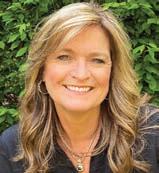


 By susA n cAMpBell
By susA n cAMpBell
Itis early spring in central North Carolina and few migrants are this far north, let alone back and ready to breed. Flocks of American robins have been evident all winter, feasting on dogwoods, hollies and other berryladen shrubs. But now they are less interested in eating and ready to start a new family. They are, indeed, the “early birds.”
American robins are found throughout most of the United States and Canada. They are one of the most familiar birds on the continent. In winter, thousands from across Canada and the northern tier of states move southward, not as a response to the drop in temperatures but in search of food. Although robins are insectivorous during the warmer months, they become frugivorous in winter. Flocks of thousands are known to forage and roost together here in the Southeast.
Both male and female robins have long black legs, orangey-red breasts and dark gray backs. Males, however, have a darker head and more colorful breasts. Robins use their thin, yellow bills to probe the vegetation and soft ground for invertebrates in the warmer months. Spiders and caterpillars are common prey as well. These birds use both sight and sound to locate prey. It is not unusual to see a robin standing still and then cocking its head as the bird zeroes in on a potential food item just under the soil surface.
Here in our area, come March, male robins return to the territories they have defended in past summers. In bright,
fresh plumage, they will sing most of the day from the tops of trees and other elevated perches, attempting to attract a mate. Their repeated choruses of “cheeree-o, cheer-ee-up” echo from lowland mixed woodlands to high elevation evergreen forests as well as open parklands in between. Females will accept a male for the season, but once summer draws to a close, so does the pair bond.
Females are the ones who select a nest site and build the nest. Suitable locations are typically on a branch lower in the canopy and support a hefty, open cup nest. Twigs and rootlets are gathered and then reinforced with mud, often the soft castings of the very earthworms they love to eat. The nest will then be lined with fine grasses before the female robin lays three to five light blue eggs. Constant incubation by the mother robin takes about two weeks, followed by two more weeks of feeding by both parents before the young fledge. Robins can potentially raise four broods in a season — although rarely do all nestlings survive. And fewer yet (about 25 percent) will make it through their first year, to breeding age.
Surviving young of the year will wander, often with siblings or a parent, until late summer, when they will flock up with other local birds. Small groups in North Carolina may move farther south if winter food here is scarce or if competition with larger northern flocks is too great. But not long after the New Year dawns, the same birds will be on the way back. Increasing day length triggers their return journey. And thus, the cycle will begin anew. OH










“Many roads lead to Rome, it doesn’t matter which one you take, as long as you mean to get there and you keep walking.”
— Author Unknown
Recently, I caught up with a former Page High School classmate, Shannon Cochran, who has appeared on an impressive number of the comedy and drama series you’ve likely watched over the last 30 years: NCIS, Fringe, Grey’s Anatomy, Desperate Housewives, Law & Order, Modern Family . . . the list goes on and on. She emasculated George Costanza (“What’s wrong with you?!?”) in the seminal Seinfeld episode, “The Parking Space.” On the big screen, she was Senator Tal’aura in Star Trek: Nemesis; and best known, perhaps, for invoking nightmares as Anna Morgan’s sinister spirit in the horror classic, The Ring. However, theater is Shannon’s true calling, primarily but not exclusively in Los Angeles and Chicago. In fact, she has been

nominated no less than a dozen times for the Windy City’s prestigious Joseph Jefferson Equity Award for acting excellence, winning twice. This talented Greensboro gal has also brought home Obie and Theatre World Awards for a role she originated in the psycho-thriller, Bug, at London’s esteemed Gate Theatre.
Shannon made her original TV debut on my weekly, summer of ’75 Public Access comedy half-hour comedy show that boasted a budget of 23.5 cents. Can I spot talent or what?
Shannon contracted the acting virus — no vaccine anticipated — at Page in Louis Hrabovsky and Frank Holder’s whimsical (I can say it ’cause I saw it) 1975 production of West Side Story. “I was Anita,” Shannon recalls of her transcendent performance. “Funnily enough, for a skinny, 5-foot-10 Irish girl, I played Anita four times in my career before it became completely inappropriate for me to play a Puerto Rican.” Page’s music teacher, Sam Doyle, was the show’s choral director. “He was a huge influence on me,” Shannon recalls. “Fortunately I’ve been able to tell him that.”
As a teenager, this statuesque ingenue blitzed the stage in productions mounted by Youth Theater, and Barbara Britton and Carol Lindsay’s Livestock Players Musical Theatre, which was situated during the summer in a sprawling cattle barn on Burlington Road where, perhaps hours earlier, the spotlight shone more on cud than scenery chewers. “I did that for several years in high school,” Shannon says. “Those people introduced me to theater and were my first teachers.”
After a stint at Wake Forest University, then graduating Summa Cum Laude from the Cincinnati Conservatory of Music, Shannon barnstormed the boards up and down the East Coast. “When the rights for A Chorus Line were released nationally, I came to Chicago to audition,” she says. At age 24, she landed that role, and then another immediately after. “I just fell in love with Chicago. Sometimes you land in a city and you know it’s the right place to be. I started working and never stopped.”
In the late-1980s, she began making three-month-long excursions into Los Angeles for pilot season before returning to the Windy City. She did that for about five years, then, as demand for TV spots increased, moved to Los Angeles around 1995.
Distinct differences exist performing for the stage as opposed to television and movies, where you arrive on set, character










wandering billy



established. “I love the rehearsal period where you’re stumbling around, trying to figure things out,” says Shannon. Also missing for her is that visceral audience reaction theater affords. “In TV and film there’s lots of sitting around and waiting. At times it just seems more technical than anything else, but the money is obscene compared to what you make onstage.”
In Los Angeles, an actor can endlessly guest-star on TV shows, never get typecast, make piles of money, and still be available for theater gigs. “That’s kind of what happened,” Shannon says. “I thought, ‘Oh my gosh, this is the greatest thing.’ I did probably 50 or 60 commercials in my 20s and 30s.”


In The Ring, no one stroked a mane more menacingly than Shannon, depicting a malevolent matriarch who comforts a vulnerable child by bagging her head before chucking her into the well. “I had a great, great time because I got to wear waist-length hair extensions for a month,” she says. “It was thicker than a horse’s tail. People stopped and stared at me wherever I went.”
On television, you might recognize her as Pam’s raven-haired mom on The Office. “I got so much feedback from that,” Shannon tells me. “They decided to do another storyline with Pam’s mom, but I was on the road so Linda Purl replaced me.”

Shannon was particularly impressed working alongside Patrick Stewart, who directed the Star Trek: Next Generation episode for which she was cast. On day one, “He gathered all the actors together to talk about the scenes, like they were [individual] acting scenes. And I thought, ‘Somebody pinch me!’” That’s highly unusual on a television production, but, “People that come from the theater have a kind of humility because they did the same thing we all did, going into a barn and putting on shows.”
She made a guest appearance at her first Star Trek convention last summer: “I got to be a Klingon on Star Trek: Deep Space Nine. I’ve never felt so powerful in my life. And I met my husband on the
set.” She was seen on two episodes of that series, but “had never been to a convention. The people were so great and they also wanted a picture from The Office or from Seinfeld, my first Hollywood job.”

Portraying Barbara Fordham in the touring company of Tracy Letts’ Tony Award-winning melodrama, August: Osage County, led to brawling under the lights with Oscar-winner Estelle Parsons. “She’s known for being irascible,” Shannon confesses of her choleric costar. “A great actress who did a very, very believable job, but she was not pleasant to tour with and not nice to most of the cast. So we all kind of rallied around each other. A wonderful show to be a part of but I cannot bring myself to compliment Estelle Parsons’ personality.”
Shannon’s dream role? “The one I’m playing now, which I also got to play seven years ago, Regina in The Little Foxes, one of the great roles of the theater. It’s a mature actress’s dream. A Little Night Music is probably my favorite musical, but Regina is my favorite role.” This may surprise you but the theater isn’t all curtain calls and stage door Johnnies. The night before we spoke, Shannon broke a finger onstage, requiring emergency surgery.
Her undoubtedly proud mother resides in Greensboro. While she visits every two or three months, Shannon Cochran is not likely to return to the Gate City to live. “I’m sure I could fall back in love with Greensboro. It’s just that I’ve gotten used to bigger city environments. San Francisco [where for almost 2 years she demolished audiences in Harry Potter and The Cursed Child], Los Angeles, Chicago, I’ll probably always live adjacent to one of those cities.”

So, no more shows between cattle auctions? OH


Billy Ingram’s new book about Greensboro, EYE on GSO, is available wherever books are sold or pulped. Shannon Cochran’s hauntingly beautiful rendition of “Send in the Clowns” from a Writer’s Theatre performance of A Little Night Music can be found on YouTube.

The assistance you need to stay in the placethat you love We’ve earned The Joint Commission Gold Seal of Approval® which validates that we follow the highest standards of safety and care.











Tickets on Sale Now!
facetoface.wfu.edu
april 12, 2023 7:30 p.m.

Moderated by NPR Arts Critic Bob Mondello
Emmy and Tony Award-winning actor and singer best known for her role as Glinda in the musical “Wicked” LJVM Coliseum, Winston-Salem
Presented by
Face to Face will unveil its next season at this event!
The woman has a gold stud through her tongue, her companion a snarling tiger tattooed on his neck. They hover over cups of Crazy Vanilla and Chunky Chocolate as she describes the final scene from an old Tom Hanks movie in which a single white feather is lifted on a breeze to float gently through the universe.
“It’s symbolic of death and rebirth,” she says, and claims the movie’s protagonist is dying as he sits on a bench pondering his young son’s passage into tomorrow. The woman with the studded tongue says the feather’s random motion is evocative of fate and free will and that we are all reborn with our final breath, our souls gently ascending. The man with the tiger tattoo sees it differently:

“Sometimes,” he says, “you’re just full of it.” And there, in the sumptuous clamor of the ice cream parlor, you become aware of a cold certainty that has nothing to do with feathers or movies or tattoos or tasty confections or the clear blue sky or the universe about which the stud-tongued woman is so emphatic on this spring morning when you are again reminded that for every bright romantic notion there’s a spiteful truth that will crush it.
— Stephen Smith
t the end of a woodsy farm road near Reidsville, I drive up to a snug, modest house that was built by the late Benjamin Ross Wrenn.
I park on a circular drive in front of the house. As I get out of the car, I notice a horse paddock just beyond the yard.
By Ross Howell JR. PHotogR aPHs By lynn DonovanWrenn’s daughters, Nancy and Heather, accompanied by a shaggy farm dog, come out the front door of the house to greet me.
Born in Greensboro to a mother who’d kept lovely perennial gardens in her native Virginia and a father who was a renowned greenskeeper, “Benny” Wrenn grew up loving the outdoors. He was given a pony by a friend of the family, Edward Benjamin, the developer of the Starmount neighborhood and Friendly Shopping Center.
“When the neighborhood boys were out riding bikes,” Heather says, “Dad’d show up riding his pony.”
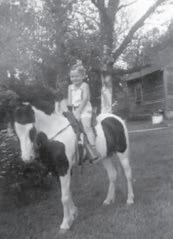
Young Wrenn was the namesake of developer Benjamin and famed golf course designer Donald Ross, another family friend.
He attended Wake Forest University on a golf scholarship and earned his law degree there. For 55 years, Wrenn ran a successful criminal law practice in Reidsville. And he was a man of many interests.
“Dad taught himself to read, write and speak Spanish at the age of 70,” Heather tells me. “He was a lifelong learner.”
I take a seat at the dining room table with his daughters.
Though he passed away in 2017, Wrenn’s presence suffuses the place. Facing me is a floor-to-ceiling mural of rolling Piedmont farmland painted by an artist friend. Heather points out a cabinet that her father made by hand. There are paintings of horses hang-




ing on the walls, along with photos of Wrenn and his daughters on horseback.
“He rode right up to age 75,” Nancy says. “He always thought of himself as a cowboy.” The sisters smile at each other.
Over the entrance to the adjoining room hangs a sign that reads “Benny’s Kitchen.”
“He loved to cook, too,” Heather says. “He was a phenomenal cook!”
The farm dog that greeted me whines to go out, and Nancy rises to open the door.
She tells me her father purchased the 70-acre farm in 1965.
“The farmer who owned the place was mowing the bottom pasture with his mule,” Nancy continues, returning to her seat. “Dad bought it from him right there on the spot.”
“I think initially he thought of the farm as his respite, his getaway from law work, where he could follow his passion,” she adds. “This was his happy place.”
But her father also wanted the farm to sustain itself financially. Ever the visionary, he set up a corporation, naming it Heathernan Inc., in honor of his daughters, to provide the framework.
Wrenn started with livestock.
“He named the farm the Cherokee Cattle Company,” Heather says. But raising cattle didn’t prove to be profitable. And since he wasn’t living on the property full-time, there were other problems.
“It always seemed like in the middle of the night, somebody would call Dad to tell him his cows were out in the road,” Heather says.
Wrenn gave up on the livestock and decided to plant Christmas trees. But the summer sun of the Piedmont proved to be too strong for the white pines he’d brought from the North Carolina mountains.
“Dad was always thinking about the future, how to sustain the farm, how to get revenues coming in,” Nancy says.
So he decided to build greenhouses.
“We started with five greenhouses to propagate annuals,” Heather says. Wrenn purchased flats of flowering plants from suppliers, then potted them in terra cotta containers he’d found at a good price in Georgia.
Ever resourceful, Wrenn designed a production line.
“He built this great big box,” Heather continues, “and he’d take his bulldozer and shove mulch and good soil in, and everybody had a cubbyhole, and you’d grab your soil, pop your plant in a pot. It was mass production!”
The potted annuals were so well received at farmers’ markets that Wrenn and his daughters expanded their selection, offering hostas, daylilies and tuberoses.

“Remember those beautiful tuberoses?” Nancy asks.
Heather nods.
But again, there were problems, especially for a father with a full-time law practice. Even with perennials, potting was laborintensive. The greenhouses were expensive to maintain and costly to irrigate, heat and cool.
Then Wrenn announced his semi-retirement from his law practice.


“He got real serious about what he was going to do next on the farm,” Heather says.
“So he started his research,” Nancy adds.
This was before the internet. Wrenn read book after book. He researched plants and growing zones. He studied soil types.
What he discovered was that the farm was situated in a region well-suited to grow an elegantly beautiful flower that had been cultivated in China for millennia. Even better, it was a hardy flower requiring relatively little maintenance in order to thrive.
“And deer won’t eat them,” Nancy adds.
Genus Paeonia. The peony.
And so, in time, Cherokee Cattle Company became The Peony Patch.
“He bought bulbs in batches direct from Holland,” Heather says.
“He started very simple, with whites and pinks,” Nancy continues. “He was thinking about marketability. Peonies are a big flower for weddings. Brides love the whites.”
Initially, Wrenn planted 2 acres, carefully measuring the distances between the bulbs, their depth in the soil and the grassy
paths between rows. The peonies flowered beautifully the first year, but there could be no harvest.
“It’s a long-term investment,” Heather says. “By rule, you should not cut stems from a peony till it’s 3 years old.”
Seeing that first “blush,” with the peonies in peak bloom, Wrenn wanted more.
“He made me cut my horse pasture in half,” Heather laughs. Carefully, incrementally, Wrenn added field after field.
Today, The Peony Patch comprises some 15 acres, with more than 50,000 bulbs in the ground.
There are four varieties. Duchesse de Nemours and Festiva Maxima are the whites, and Monsieur Jules Elie and Sarah Bernhardt are the pinks. All are double-blossom varieties, so they’re enormous.
In a typical year, the peonies are cut over a 14- to 21-day period beginning May 1, depending upon the weather.


This is a time of intense labor.
“The first couple days, we’re cutting maybe a couple hundred stems, walking each row, each field,” Nancy says. By the third or fourth day — especially if there’s a day of full sunshine with
temperatures in the 70s or 80s — the cutters might harvest 3,000 to 4,000 stems a day.
Fortunately, there are three laborers who have been with the farm for years. They see to it that each stem is individually cut, placed carefully in stackable bins and stored in a walk-in cooler at 34–36 degrees Fahrenheit for no more than two weeks.
“The flowers have to be cut at just the right time,” says Heather. “You can have one that’s not just right at 7 o’clock in the morning but at 4 o’clock in the afternoon that same day, you’d better get it.” Cutters walk each row in each field, gathering flowers, sometimes twice a day.
“Ideally we harvest stems that are at least 24 inches long,” Nancy says. “And since the blossoms are so big, they’re very heavy.”
The primary market for the peonies is wholesalers. Many come directly to the farm to pick up their orders, though Nancy or Heather might make deliveries on a limited basis as far away as Raleigh or Charlotte.
One of their most loyal customers is Randy McManus of Randy McManus Designs in Greensboro.
“Randy has been a real business partner since my Dad put his first peony in the ground,” Nancy says. “He’s a true peony lover.”
After the back-breaking surge of the blush, the harvest gradually tapers off. In a typical season, The Peony Patch will sell 10,000–12,000 stems. Even after harvest, the fields remain colorful for a few more days.
“We always leave at least three blossoms on each bush,” Heather says.
In preparation for the next season, the stackable bins will be washed and stored. The cooler will be shut down and cleaned with bleach. The fields will be bush hogged. Later — and only after at least two hard frosts — the fields are burned and raked for debris, as wind and rain permit.
Usually Nancy and her family — including grandchildren — will drive up from her home in Wilmington to celebrate Christmas at the farm with Heather and her husband.
Then it’s a waiting game. Waiting to see when the tiny red but-
tons of new peony shoots begin to show themselves for spring. There are ongoing challenges for Wrenn’s daughters, of course. The need to replace equipment costing thousands of dollars. A new species of tree invading the fields. The creeping vines of poison oak choking the bulbs. And, since fields have yielded cuttings for well more than 20 years, they are long past the time when most growers dig up, clean and sterilize bulbs to rotate them into new fields.
And there’s slim payoff on the investment and work after expenses. Nancy and Heather tell me it’s actually the income from rental houses their father put on the farm that goes farthest to sustain it.

So why continue?
“Sometimes the phone rings during harvest and it’s a little old man looking for peonies to give his wife for their 70th anniversary celebration,” Heather says. “Or it’s a bride’s mother who says all her daughter wants for her wedding are peonies. Or it’s just someone who remembers the flowers that grew in their grandmother’s garden. People feel such passion for the peony. I think that’s why Dad selected it.”
Wrenn’s other daughter answers this way.
“I’m a project manager for an information technology company and Heather’s a nurse,” says Nancy. “The peonies are a real change of pace for us. Here we go from service jobs to production jobs, where we can work hard and see what we’ve accomplished during the day. That’s rewarding.”
“But mainly I do it out of honor and love and respect for my sister and Dad,” Nancy concludes. “When I’m on this farm, I feel very close to him.” OH

For more information or to contact Nancy and Heather, visit www.thepeonypatch.com.
Ross Howell Jr. is a peony lover and an O.Henry contributing writer. Email him at ross.howell1@gmail.com.

For decades, a Paul Billingsley-designed fountain was a centerpiece during the glory days of the sprawling Southcenter Mall near Seattle, Washington. Now, the unique work has been rescued, brought thousands of mile across country to occupy pride-of-place at a new home in Greensboro’s Irving Park.
How — and why — did this happen?
The phone call came early one frigid winter’s morning. “Hey, go check out this fountain. It’s really neat, and you’ll want to get some pictures while it’s partially frozen,” said loverof-the-great-outdoors Daniel Craft, who called me with the tip. He dangled a tantalizing tidbit: “There’s a great story that goes along with it.”
Having admired the striking water feature — a lotus flower — that was equal parts bronze sculpture and fountain, Craft was curious about the distinctive fountain. He contacted neighbors Marius and Hilary Andersen to learn more. He learned the mesmerizing beauty was more than a graceful fountain— it held a mystery at its heart. And its provenance spanned from Seattle to Greensboro — with a story that began 55 years ago.
More than one fountain was intertwined with its history, too, the Andersens explained.
In 1968, a fountain was commissioned from noted Washington state sculptor George Tsutakawa by developers of the Southcenter Mall and was ready for installation. Tsutakawa had designed and built scores of fountains and works of public art; this particular piece was intended for a 1-million-square-foot mall being built in Tukwila, Washington, outside Seattle. He had produced another in 1962 for Northgate Shopping Center, also in Washington.
The Tsutakawa fountain, however, went missing. It was stolen shortly after delivery at the site — before it was installed.
Hilary Andersen’s father, Don Samuelson, a Seattle native, was a young executive with Bon Marché, a primary anchor of the new mall. He remembers the


fountain’s disappearance well. (And though he doesn’t have a photo of the original work, he recalls details which were well known to his daughter, Hilary, and her husband, Marius.)
“It was made in bronze, and people steal copper and bronze all the time,” relates Marius. “It could have been hauled off for scrap — who knows?”
That, too, remains a mystery, as the fountain was never recovered.
Tsutakawa was known for sculptures that fused Japanese and American styles. Among a slew of other notable works found throughout America, Canada and Japan, he designed the medals for the 1962 Seattle World’s Fair and the 1976 Spokane Exposition.
The mall developers reached back to Tsutakawa to request a replacement, but his work was in such high demand he was unable to accept another commission. Instead, his student assistant, Paul Billingsley III, also a fine artist, took on the project. The resulting fountain, a graceful lotus flower, was his own design. Naturally, he was influenced by the master artist.
“I think if you look at the lotus flower, you’d be hard pressed to say that it’s not along the lines of other sculptures that Tsutakawa made.” Not a replica of the lost original, explains Marius, but done in the spirit of the original.
Fortunately, the replacement fountain Billingsley created was safely delivered and escaped theft.
“They install it, have an opening and big party in the mall — this was installed inside the mall. Fast forward. It’s part of the mall for many years, until the mid-’90s when they’re remodeling,” says Marius. “By this time, Hilary’s dad has been an exec with Bon Marché, traveling throughout the Pacific Northwest.”
“It was probably 1996,” adds Hilary.
As fate would have it, her father, now a vice president, returned to Washington State’s Tukwila mall where he began his career
nearly 30 years earlier. And he brought fond memories of the graceful fountain. He well remembered the fountain’s backstory, which was part of his own experiences, having participated in the opening celebration when the work was first installed at Southcenter.
When Samuelson learned of a scheduled remodel, he asked the mall owners what they were going to do with the fountain. Learning it was slated to be removed, he offered to buy it. His offer was accepted.
For many years, Tsutakawa’s name was renowned in the Northwest, especially the Puget Sound area, and so was Billingsley’s. The initials “TUB” had frequently appeared on Tsutakawa’s installations — “B” for Billingsley.
Billingsley earned a fine arts degree at the University of Washington, and, after a stint in the Army, returned to Seattle and worked for Tsutakawa. According to his obituary, fountains they created were displayed in Seattle, Los Angeles, Honolulu and abroad.
Hilary’s father, Samuelson, called Marius, who then lived nearby, with an S.O.S. “I need you to bring your pickup truck and help me,” he told his son-in-law.
“We took it home to his house,” says Marius. In a vintage photo, he shows the work loaded on the back of a truck.
Samuelson wanted the fountain to be saved and enjoyed. He planned to donate it to the city of Tukwila for a public space or park. As is frequently the case with donated works of public art, there are costs associated with siting a piece, maintaining and also insuring it.
Instead, the fountain landed in Samuelson’s backyard, explains Marius. “He didn’t install it with a pump as a fountain, just as a sculpture.”

At the time, neither Hilary nor her mom were sure about it. But Marius and his father-in-law were true fans.

Fast forward to 2020. The couple, founders of Creative Snacks, had relocated to the Triad.
Once their new North Carolina home was built, Samuelson, knowing how Marius loved the fountain, approached him. “He says, ‘This deserves a home. Would you want it?’” Marius relates.
But now Hilary, who had developed her eye for art, truly admired the work, too. The couple agreed, and made plans for the piece to be shipped from the West Coast to Greensboro in the fall of 2020 as they were completing their home.
“I had to get a crate built for it to be shipped; then ship it and set it up. So, this is the most expensive gift I’ve ever been given,” Marius says and shrugs with a laugh.
But once it arrived, they discovered the fountain was too big for the courtyard outside their bedroom as initially discussed. Plus, nobody would see it there.
Instead, the Andersens decided to place it in the front yard, where it was installed by the summer of 2021. Once up and running, it became an instant showstopper.
Eventually, new pieces of information flowed, too. Billingsley had died in November of 2013, and his family sought information about his works.
“My father-in-law is a Seattle native,” says Marius. “He has a Facebook presence. Paul Billingsley’s son, Peter, posts there, and asks, does anybody knows what happened to this fountain? Hilary’s dad says, ‘Hey, I know exactly what happened!’”
Samuelson tried to learn more about the artist, Paul Billingsley, and his works. Peter told him that at least two other fountains created by his father were purchased and placed in North Carolina
— possibly as close by as the Triangle or Wilmington.
He learned of Billingsley’s many talents. In addition to using his creative skills in art, Billingsley contributed to designing molds used in the fabrication of artificial bones for Pacific Research. He designed a double-keel boat, and was a prolific bluegrass musician who built his own instruments. He also designed and built his own home, and converted a VW bug into an electric car, according to his obituary.
The fact that the fountain was going to be hauled away was the part, Marius says, that deeply motivated him. A marvelous artwork might have been lost, destroyed for scrap.
“What’s wrong with people? That’s not going to happen,” he determined.
With the fountain in Greensboro, the couple realized it was originally built for indoor use. Concerned about the cold of winter, Marius went to Tractor Supply and found heaters farmers use to keep livestock watering troughs from freezing. Once in place, the heaters worked to his great satisfaction.
Ultimately, the fountain’s biggest advocate, Samuelson, traveled to Greensboro in May 2022 for a grandchild’s graduation and finally saw the fountain restored to its former glory, fully installed and operational.

“Our neighbors, Kerry and John Ellison, said ‘Thank you for this.’ The fountain reminds them of being in Aspen, given the way the light dances on the leaves. They have coffee on their porch and enjoy the white noise of it,” says Hilary.
When Hilary learned a few people didn’t necessarily like the fountain, she grew protective. “What do you mean? How can you not love it?”
But Marius likes that not everyone agreed. “I love that some think it’s terrible and some love it.” He feels that’s what art does — it stimulates.
The couple mentions other Greensboro homes with avant garde sculptures, something they have come to admire.
“We don’t pretend to be art connoisseurs,” the couple stresses. But their daughter, an artist, is attending the prestigious Rhode Island School of Design this fall.
Meanwhile, the family hopes to visit Billingsley’s other North Carolina-based fountains.
Who knows how many exist in total? When Tsutakawa retired from teaching, he undertook 60 commissions between 1960–69. That time period dovetails with when Billingsley worked beside him as a valued student assistant. An impressive body of work also includes sculptures, gates and fountains. Among others, Tsutakawa created the East Cloister Garth Fountain at the National Cathedral in Washington, D.C.
The likelihood is strong that Paul Billingsley was working alongside as these notable installations were created — and they may even bear the tell-tale “TUB” initials.
In Antique Road Show parlance, check artwork for the all-important signature — even outdoor statuary. They may reveal a surprising history and perhaps an odyssey. OH



What’s
By m aRia JoHnson PHotogR aPHs By a my FReemanShe drove the building contractor and subcontractors crazy, she admits.
But Janine Wagers knew what she wanted her and her husband’s new home to look like: a barn.

A gussied up barn, to be sure. Stylish. On point. Artistic. But still, a barn.
“A modern barn,” Wagers says.
Design-wise, she was confident she could mold the details, inside and out, to achieve the desired effect. After all, she’s the director of visual merchandising for High Point-based Universal Furniture, a stalwart of the contemporary furniture world.
A 38-year veteran of the industry, Wagers supervises allthings-eyeball in the company’s massive local showroom, open to trade customers only, and on other carefully curated sets around the country.
Comfy in a barrel-back chair covered with plush lavender, she pauses our interview to take a call about an upcoming show in the Hollywood Hills to promote a new line of furniture bearing the name of Australian model Miranda Kerr. The line is sold exclusively through retailer One Kings Lane, a collaborator in the show.
She hangs up and apologizes for the four cats and three dogs that rush inside through a door that she has left open. There’s a brisk breeze outside, and, well, why not invite it in, too? Flies? No worries. She uses a leaf blower to knock their bodies off the upper window sills, should they not find the exits.
“Welcome to the funny farm!” she announces.
The farm part is true. The home of Wagers and her husband, Ty Pruitt — who retired from the veneer business last year — occupies land that belonged to a working farm in northeast Davidson County in the not too distant past.



A horse barn stood on the graveled flat that doubles as the home’s front yard and parking area. The old barn had collapsed by the time the couple bought their 50-acre parcel in 2019. They paid someone to raze the structure before the 2021 construction of their new digs, a stylized homage to its vanished cousin.
Rooted in a simple rectangular footprint and flanked by lean-to porches, the three-bedroom, 3,300-square-foot home stands like a glowing beacon — with silver roof and milky board-and-batten siding — on a grassy hill. From this crest, Wagers and Pruitt look out, through 55 windows with nary a blind or drape, over the swells and troughs of their land. In most directions, horizon meets tree line
“It’s wonderful waking up in the morning. You can see the sun coming up. It’s very freeing,” says Wagers, who sits in the great room, which might be better described as a great big ol’ room.

It is vast, a white-walled space that soars 24 feet, past dangling geometric lighting fixtures, to the vaulted ceiling above. The expansive room is anchored to the Earth by thoughtful tethers, most notably a black, slate chimney chase that stretches all the way up one wall, gleaming like a monolithic monument.
Contractors worried about the weight of the slate. You’ll figure it out, Wagers said.
They did.

The result: a visual wow that slacks the jaw and bends a smile in appreciation of creative nerve.
You could think of the home as a series of abstract paintings. Most of the canvases — walls in this case — are left blank, white. The frames, in the form of blackmullioned windows and other hard lines, are inky. The energy comes from splashes of color, in this case furniture and accessories, and from Wagers herself.
A fusion of down-home and up-to-date, she’s dressed in strategically ripped, cuffed jeans, a loose gray pullover and clear rectangular earrings. Her naturally gray hair, cut into a sharp A-line bob, still contains more coal than ash. Her eyes stand out like blue, steel rivets.
When she pours her honeyed Georgia accent (born in Dalton, schooled in Athens, go ’Dawgs) over her observations, you can’t help but laugh.
Example: The three-pronged lighting fixtures hanging overhead are called “talons” in the catalog.

“I call ’em chicken feet,” she muses. “But ‘talons’ is much more refined.”
She is surrounded by the trappings of her professional life.
Two curved, teal-green sofas face each other like parentheses in the center of the room. They clasp a shaggy, splashy rug and a glass-topped coffee table with a truss-like base. The end tables are amoeba-shaped pillars. All of the pieces, save the rug, are by Universal.
It makes sense. Wagers has spent the bulk of her career — a 10-year stint in the ’80s and ’90s and the current 15-year run — with the outfit.
But her home is no company showroom.
Ironically and honestly, Wagers pooh-poohs interiors that are lifted straight from showroom floors, especially if the cutting-and-pasting happens all at once.
Instead, she favors the picker approach. Pick the pieces you like. Fold them into what you have. Take your time. Don’t be afraid to veer off the designer-approved path into yard sales, flea markets, family attics, antique shops and consignment stores. See what calls to you.
Gradually, bring the pieces into concert. They should tell a story. Your story.
She has painted the couple’s own story with care and a keen eye.
“Want a tour?” she asks.
First stop, kitchen and dining area, which is really a part of the great big ol’ room, though the kitchen is technically tucked under a second-story loft that serves as the couple’s home office with side-by-side desks.
The overhang is underlined by a cosmetic beam salvaged from the barn that once sat outside.
Directly below, the metal-topped family table is

headed by two office chairs, businesslike in gray steel and dark green Naugahyde, that were plucked from a Salvation Army store. As looser counterpoints, modular plastic chairs from Target line the sides. Wagers has her eyes peeled for replacement chairs. Ditto a new tabletop.
“I want to put a brass top on it,” she says.
She’s happier with the kitchen, where waterfall granite countertops fold over the island and base cabinets. The black wall-mounted cabinets extend to the 10-foot ceiling. She insisted.
The cabinets installers pushed back: “What will you do with the top cabinets?”
Wagers countered: “Store my once-a-year things. I have a folding ladder.”
She tilts her head back to eye the upper cupboards. Her grandmother’s stemware is up there, she assures. Word taken.
“The look is important,” she says of the cabinets.
Don’t confuse “the look” with perfection. Wagers not only tolerates imperfections, she insists on leaving the naturally occurring ones. She points to gouges in the sealed-but-unstained concrete floor. The contractor wanted to fill them with epoxy.

“I was like, ‘No! I like it messed up!’” she recalls.
The same goes for a section of the kitchen floor that had to be cut out to reach a clogged pipe. She taps the spot with the toe of a leopard print bootie. The patched floor is going to be a slightly different color, the concrete people warned.
Fine, she said.
“I like defects,” she explains. “I find it easier to live life with defects.”
Her heels peck the imperfect floor as the tour proceeds past a gigantic blackboard where she and her granddaughter like to doodle everyday hieroglyphics in white chalk.
She stops at the powder room, an exception to the rule of


blanched backgrounds. The room is a visual sink hole, but in a good way, sucking the eye into a dramatic statement uttered with black peel-and-stick wallpaper, navy-hued subway tile, smoky floor tile and a counter hewn from a cedar tree that Wagers saved from road-widening near the couple’s former home in Sedgefield. Most of the tree’s wood went into Universal pieces. She nabbed a nub.
“You can have fun with a powder room,” she says.
Click-click-click to the primary bedroom. Does she mean the master bedroom?
Nope, that term is out, she says. Think about it.
Used to changing with the times, Wagers absorbs the update and moves on. The couple’s bedroom is simple and airy. Ballast comes from wooden wardrobes on opposing walls. The cabinets came from the school where her parents taught in Dalton, Georgia.

Chipped, dinged and dated with black-marker graffiti on the shelves, Wager’s free-standing closet is home to T-shirts, socks and
other dresser staples. For hanging clothes, she and Ty share a walkin closet in the bathroom. They use the same flat-bottomed tub and glass-enclosed shower, too, but they “go” their separate ways with his-and-hers toilet rooms.
“This is my favorite room in the house because it’s all mine,” she says. “Don’t come in here. Don’t use it.”
She has personalized the room with a wall full of necklaces that hang from nickel drawer pulls screwed directly into the wall. Practical. Funky. Changeable. A vertical playground.
That sense of fun permeates the house. One hallway pops with a bank of orange basket-style gym lockers found in a junk store. Their son, Will, used the array in his room while growing up.
More mirth lurks in an upstairs TV room, where a jigsaw puzzle sprawls on a lemony Formica table ringed by vintage Bertoia-style wire chairs. On a nearby wall, Wagers assembled a collage of family memories.
A watercolor painting by Will.
A plaque recognizing Ty’s service as Wolf Tribal Chief at the High Point YMCA.
A postcard with a wry drawing of eggs dripping from a shower head, a memory of the sulfur-smelling water they encountered in Iceland.
Wagers tinkered with more than a dozen pieces, hanging and rearranging until she was satisfied.


“What was the worst that could happen?” she shrugs. “A few extra holes in the wall?”
She was more deliberate with a gallery of family photographs that plaster both sides of another hallway, an allée of DNA.
“That’s my son. That’s my step-daughter. That’s my dad and his sister. That’s Ty when he was a baby,” Wagers says, pointing as she goes.
To get the composition right, she measured the frames — all in tawny tones — and laid them out on a computer. Most of the pictures are rendered in black and white, an intentional stroke. The exhibit includes a non-photographic item: a note written in ink and torn from a small memo pad.
“Janine, I love you. Grandma.”
Wagers’ grandmother pressed the paper into her hand when Wagers visited her in assisted living. Wagers carried the note in her billfold for a long time before she flattened it and surrounded it with a sumptuous gold frame — a jot of personal history elevated to its rightful place in the emotional pantheon.
Wagers, soon to be 60, smiles at her grandmother’s shaky script. These days, she catches tiny changes in her own handwriting, a reminder that she must make hay while she can.
A modern barn is a good place for that. OH
The Full Pink Moon rises on Thursday, April 6. Native Americans named this moon for the creeping phlox now blushing across the tender earth. This year, the Pink Moon also happens to be the Paschal Moon — the first full moon of spring. Also called moss phlox, the fragrant blossoms of this herbaceous perennial make it a butterfly magnet.
April is a quivering brood, a bellyful of earthworms, a fledgling’s maiden flight.
The sun is out. A banquet of wild violets glistens in the wake of a spring rain. The birdbath runneth over.
In the garden, a pair of robins scurry from worm to worm, flit from soft earth to wriggling nest, from wriggling nest to soft earth. There are mouths to feed. Four beaks, bright as buttercups, open and urging for more, more, more.

Born pink and blind, the robin hatchlings know nothing of rat snakes or corvids; nothing of cold winds or the bloodthirsty cat by the birdbath. By some miracle, the chicks emerged from pale blue eggs into a world that is soft, safe and kindly. By some miracle, they know only the warmth of their mother, the warmth of the nest, the warmth inside their plump, translucent bellies.
Days from now, everything will change. First, tiny quills will appear on the nestlings’ feeble bodies. Next, their eyes will crack open, the sudden light revealing a world of color and danger and new horizons.
In two weeks, when the dandelions have multiplied and the earliest strawberries blossom, the speckled fledglings will jump the nest.
What happens next?
For the young robins: peril or miracle.

For the robin pair: another nest, another clutch, another thousand trips from quivering brood to soft earth.

But it’s not the only pink flower in bloom. Tulips come in 50 shades of it.
There’s the pink-flowering dogwood, the eastern redbud (pardon the misleading name) and the showstopping cherry.
Don’t forget the pink azaleas, coming soon. Easter (aka, the moveable feast) always falls on the first Sunday following the Paschal full moon. This year, Easter is celebrated on Sunday, April 9. If you’re planning to hide eggs, careful where you stash the pink ones.
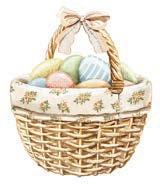
Today has been a day dropped out of June into April.
— L.M. Montgomery, Anne of Windy PoplarsAccording to Smithsonian magazine, the Lyrid meteor shower is one of the 10 most “dazzling” events for stargazers in 2023. This year’s shower peaks on Saturday, April 22 (Earth Day).
“Observers are usually able to see about 18 meteors per hour in a clear, dark sky,” the article states, “though on rare occasions, the Lyrids can surprise viewers with as many as 100 meteors in an hour.”

At 6 percent illumination, the waxing crescent moon should make for favorable viewing conditions.
As for a clear sky? We’ll see. Or, we won’t. OH
























It is my goal to ensure you find the right home or attract the right buyer - on your terms!
Leslie Stainback Broker/Realtor® 3601 Lawndale Drive Greensboro, NC 336.508.5634 mobile
Leslie.Stainback@trmhomes.com lesliestainbackrealtor

"We just wanted to express our deep appreciation for going above and beyond for my parents during this crazy time of real estate frenzy. Although it may be your job, you do it with grace and integrity, and that is hard to find. Your work has made a difference."

 -Rachel and Craig
-Rachel and Craig











These critters are just looking for a safe place to raise a family. But it probably shouldn’t be in your home. We remove wildlife with minimal stress and maximum effectiveness for you and the animals

Bats, rodents, squirrels, birds, raccoons, opossums, and groundhogs
How are we different from animal pest control?
• We secure your home from roof to foundation to prevent wildlife re-entry
• We do cleanup, disinfecting, and home repair

• We do not use poisons or euthanize wildlife

•
•
•






Perched on a hill overlooking Fisher Park, the Grimsley-Frye House was built in 1908, and only three owners have stewarded its care. This landmark Neoclassical Revival style property was designed by architect Richard Gambier and highlights the Mount Airy granite stonework of Andrew Schlosser. A stately wrap-around porch and porte-cochere lined by Ionic columns lead to the grand 1st floor entry graced by a winding staircase, 2 parlors, formal dining room, kitchen and more. Four bedrooms, an office and 2 baths complete the second story. Bonuses include tall ceilings galore, original lead-beveled glass windows, 5 antique fireplaces, an attic with cedar closets/chests, a garage with attached office, and glorious 115-year-old woodwork everywhere. Each room commands a scale not found in recent eras. Just a short walk to restaurants and downtown Greensboro activities, this historic yet hip home is ready to romance and entertain its next decades-long owners. Welcome to the home for the ages!





Daily tours + wedding & special event rentals










Over 25,000 tulips in bloom during April! cienerbotanicalgarden.org

22-room, self-guided house museum tours American ingenuity, eccentric architecture and Victorian culture! kornersfolly.org

prior to their
Point
debut. This event will include a Collective Exhibition
Sale of thirty original works of art by Setsuya Kotan i
Lancaster supports and embraces the talent of local artists by showcasing their work, fostering the connection between art and design. This collection spans 15 years of Kotani’s work and is graciously on loan by The Artery Gallery of Greensboro.
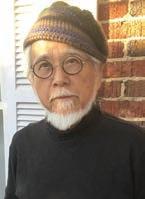































Although conscientious efforts are made to provide accurate and up-to-date information, all events are subject to change and errors can occur! Please verify times, costs, status and location before attending an event.
To submit an event for consideration, email us at ohenrymagcalendar@gmail.com by the first of the month one month prior to the event.
WINE WEDNESDAY. 5–8 p.m. Sip wine, munch pizza and enjoy the soothing sounds of live jazz. Free. Double Oaks, 204 N. Mendenhall St. Greensboro. Info: double-oaks.com/wine-wednesday.
LIVE MUSIC. 6–9 p.m. Evan Olson and Jessica Mashburn of AM rOdeO play covers and original music. Free. Print Works Bistro. 702 Green Valley Road, Greensboro. Info: printworksbistro.com/gallery/music.
FAMILY NIGHT. 5–7 p.m. Enjoy an artdriven evening with family and friends in the studios. Free. GreenHill Center for NC Art, 200 N. Davie St., Greensboro. Info: greenhillnc.org/events.
JAZZ AT THE O.HENRY. 6–9 p.m. Sip vintage craft cocktails and snack on tapas while the O.Henry Trio performs with a different jazz vocalist each week. Free. O.Henry Hotel Social Lobby, 624 Green Valley Road, Greensboro. Info: ohenryhotel.com/o-henry-jazz.
MASTERPIECE FRIDAYS. 10 a.m.–noon. Kids under 5 and their caregivers enjoy story time plus artmaking. Admission: $7. GreenHill Center for NC Art, 200 N. Davie St., Greensboro. Info: greenhillnc.org/events.

01—15
BARN THEATRE. Times vary. The Church Basement Ladies are back with The Last Potluck Supper, a musical voyage through 100 years of their history. Tickets: $28+. The Barn Dinner Theatre, 120 Stage Coach Trail, Greensboro. Info: barndinner.com/2023.
01—09
MOTHER COURAGE AND HER
CHILDREN. 7:30 p.m. Discover the boisterous comedy filled with original songs set against the backdrop of the Thirty Years War in what many consider to be one of the greatest plays of the 20th century. Tickets: $15+. Freedman Theatre, 1533 S. Main St., Winston-Salem. Info: uncsa.edu/performances/index.aspx.
01, 15, 22 & 29
BLACKSMITH DEMONSTRATION. 10 a.m.–4:30 p.m. Watch a costumed blacksmith in action as he crafts various iron pieces. Free. Historical Park at High Point Museum, 1859 E. Lexington Ave., High Point. Info: highpointmuseum.org.
BEN VEREEN. 7:30 p.m. Steppin’ Out is a one-man show starring Vereen and featuring musical tributes to Broadway, Frank Sinatra and Sammy Davis Jr. Tickets: $30+. High Point Theatre, 220 E. Commerce Ave., High Point. Info: highpointtheatre.com/events.

SIP, SAVOR, SHOP NC. 1–4 p.m., 5–8 p.m. Taste beverages and eats from North Carolina wineries, distilleries and specialty vendors while shopping boutiques and artists from across the state. Tickets: $15+. Greensboro Coliseum Complex, 1921 W. Gate City Blvd., Greensboro. Info: greensborocoliseum.com/events.
LORNA SHORE. 6:45 p.m. The Pain Remains Tour delivers some of the best in American deathcore to the stage. Tickets: $75. Piedmont Hall, 2409 W. Gate City Blvd., Greensboro. Info: greensborocoliseum.com/events.
04
RONAN FARROW. 7:30 p.m. The Guilford College Bryan Series welcomes the Pulitzerwinning investigative reporter to an evening of conversation. Tickets: $55+. Steven Tanger Center, 300 N. Elm St., Greensboro. Info: tangercenter.com/events.
EAGLES. 8 p.m. The classic American rock band soars onto stage with its greatest hits, including a full-length “Hotel California,” accompanied by orchestra and choir. Tickets: $129+. Greensboro Coliseum Complex, 1921 W. Gate City Blvd., Greensboro. Info: greensborocoliseum.com/events.
05
POSTMODERN JUKEBOX. 8 p.m. Enjoy a night of vintage music, such as swing and jazz, made modern with Scott Bradlee’s band. Tickets: $27.50+. Piedmont Hall, 2409 W. Gate City Blvd., Greensboro. Info: greensborocoliseum.com/events.
06, 13 & 20
GET CRAFTY. 6 p.m. From 3D printing to sewing, learn new skills and complete simple
SPRING IS A GREAT TIME TO HOP INTO A LOCAL STORE












“I couldn’t be happier with my renters, or my rental income”
Tom Arevian Burkely Rental Homes client
april calendar
13—15

ONE ACT PLAYS. Times vary. Greensboro College presents two one-act plays, Mirrors and I Want to Play with Dead Rats. Gail Brower Huggins Performance Center, Odell Building, 815 W. Market St., Greensboro. Info: greensboro.edu/academics/arts/ performance-calendar.
13

JESS KLEIN. 8 p.m. The singer-songwriter takes the stage with her brand of bluesy gospel fusion. Tickets: $10. Flat Iron, 221 Summit Ave., Greensboro. Info: flatirongso.com/events.
UNCG JAZZ ENSEMBLE II. 7:30 p.m.
UNCG’s Miles Davis Jazz Studies Program celebrates this watershed year with saxophonist Rahsaan Barber for a diverse performance of music. Tickets: $9+. Carolina Theatre, 310 S. Greene St., Greensboro. Info: carolinatheatre.com/events.
14—19
ROCK OF AGES. Times vary. Relive your big hair days with UNCG’s production of the jukebox musical built around classic rock songs from the ’80s, especially from the famous glam metal bands of that decade. Tickets: $20. Taylor
Theatre, 406 Tate St., Greensboro. Info: vpa.uncg.edu/all-events/category/cvpa.
14—16
SPRING POTTERY TOUR. 10 a.m.–5 p.m. This special 15th anniversary event is a self-guided tour of individual pottery galleries, studios and workshops in Seagrove, the Handmade Pottery Capital of the USA. Free. Info: discoverseagrove.com/events-all.
14—15
SPRING DANCES. 7:30–9:30 p.m. Enjoy a night of performance and choreography by UNCG School of Dance faculty and guest artists. Tickets: $7+. Dance Theatre, 1408 Walker Ave., Greensboro. Info: vpa.uncg.edu/all-events/category/cvpa.
14
SCULPTURE DEDICATION. 4:30 p.m. Pakistani-American sculptor Huma Bhabha discusses her work and celebrates the dedication of her monumental sculpture, “Receiver.” Free. Weatherspoon Art Museum, 500 Tate St., Greensboro. Info: weatherspoonart.org/calendar.
BARBRA LICA. 7:30 p.m. The rising star in the Canadian jazz scene captivates audiences with her warm blend of country, pop and jazz. Tickets: $25+. High Point Theatre, 220 E. Commerce Ave., High Point. Info: highpointtheatre.com/events.
HARLEM GLOBETROTTERS. 7 p.m. Everyone’s favorite basketball tricksters show off their skills against the Washington Generals. Tickets: $20+. Greensboro Coliseum Complex, 1921 W. Gate City Blvd., Greensboro. Info: greensborocoliseum.com/events.
15
TRIO ZIMBALIST. 7:30 p.m. Trio Zimbalist, featuring violinist Josef Špaček, cellist Timotheos Gavriilidis-Petrin, and pianist George Xiaoyuan Fu carries on its namesake’s storied legacy through its commitment to artistic excellence. Tickets: $35+. Steven Tanger Center, 300 N. Elm St., Greensboro. Info: tangercenter.com/events.
COMEDIAN KATIE K. 8:00 p.m. You’ve seen her make the judges laugh on America’s Got Talent. Experience her humor for yourself. Tickets: $15. The Idiot Box, 503 N. Greene St., Greensboro. Info: idiotboxers.com.
STUNT DOGS. 2 p.m. & 7:30 p.m. Chris Perondi’s Stunt Dog Experience delivers a high-energy frisbee dog show mixed with incredible tricks while promoting responsible pet care and adoption. Tickets: $10+. High Point Theatre, 220 E. Commerce Ave., High Point. Info: highpointtheatre.com/events.
LOS TEMERARIOS. 8 p.m. Enjoy a night of Mexican Grupera music. Tickets: $49+. Greensboro Coliseum Complex, 1921 W. Gate City Blvd., Greensboro. Info: greensborocoliseum.com/events.
16
SITKOVETSKY & FRIENDS. 4 p.m. The Greensboro Symphony conductor performs with Trio Zimbalist and violist Scott Rawls. Tickets: $35. Tew Recital Hall, 100 McIver St., Greensboro. Info: greensborosymphony.org/event.
EXHIBITION & SALE. 2–5 p.m. Peruse a collection of 30 original works spanning 15 years by Japanese native and artist Setsuya Kotani, a retired UNCG professor. Free. Lancaster showroom, 104 North Main St., High Point. Info: www.lancasterccu.com.

SENSORY FRIENDLY CONCERT. 2 p.m. The Greensboro Concert Band presents a

two-part concert. A smaller ensemble plays softer music for those with sound sensitivity followed by the full band playing family favorites. Free, donations of canned goods accepted. Van Dyke Performance Space, 200 N. Davie St., Greensboro. Info: gcbandonline.wixsite.com/gso-concert-band/events.
18—23
IT’S SHOWTIME. Times vary. Beetlejuice, a darkly comedic musical based on the Tim Burton film tells the story of a haunting couple, an angsty teen and the ghost with the most. $33+. Steven Tanger Center, 300 N. Elm St., Greensboro. Info: tangercenter.com/events.
18
PLAY IT AGAIN, SAM. 7 p.m. Catch the classic film, Casablanca, starring Humphrey Bogart and Ingrid Bergman, on the big screen. Tickets: $7. Carolina Theatre, 310 S. Greene St., Greensboro. Info: carolinatheatre.com/events.
19—23
OPERA. Times vary. The A.J. Fletcher Opera institute performs The Rivals, a bright and witty comedic opera full of love, mistaken identities, duels and misunderstandings Tickets: $15+. Agnes de Mille Theatre,
1533 S. Main St., Winston-Salem. Info: uncsa.edu/performances/index.aspx.
19
UNIVERSITY BAND. 7:30 p.m. The UNCG’s Band performs “Star Ship,” “Three Ayres from Gloucester” and Vaughn Williams’ “Folk Song Suite.” Free, reservation required. UNCG Auditorium, 408 Tate St., Greensboro. Info: vpa.uncg.edu/all-events/ category/cvpa.
HOSIERY HISTORY. 10 a.m. The High Point Historical Society hosts Dr. Doris H. Kincade and Dr. Elizabeth H. Hull as they discuss the state’s textile and apparel industries as well as their history. Free. Historical Park at High Point Museum, 1859 E. Lexington Ave., High Point. Info: highpointmuseum.org.
20
HERB PLANT SALE. 7:30 a.m.–2:30 p.m. The North Carolina Unit of the Herb Society of America invites you to shop hundreds of herbs for culinary use and landscape features. Free; BYO boxes. Greensboro Farmers Curb Market, 501 Yanceyville St., Greensboro. Info: ncherbsociety.org.



THE WAILIN’ JENNYS. 8 p.m. The trio consisting of Nicky Mehta, Ruth Moody and Heather Masse performs folk-pop hits with its achingly perfect signature vocal sound. Tickets: $30+. Carolina Theatre, 310 S. Greene St., Greensboro. Info: carolinatheatre.com/events.
21–30
HIGH SCHOOL MUSICAL 2 JR. Times vary. Enjoy the music and dancing that made Disney’s High School Musical and High School Musical 2 such a phenomenon live on stage. Tickets: $15+. Community Theatre of Greensboro, 520 S Elm St., Greensboro. Info: ctgso.org.
21–22
DANCE THESES. 7:30–9:30 p.m. UNCG BFA dance students perform original works of choreography. Tickets: $5+. Dance Theatre, 1408 Walker Ave., Greensboro. Info: vpa.uncg.edu/all-events/category/cvpa.
21
BINGO. 7 p.m. Brenda the Drag Queen hosts an evening of Green Queen Bingo for
ages 15 and up. Tickets: $15+. Piedmont Hall, 2409 W. Gate City Blvd., Greensboro. Info: greensborocoliseum.com/events.

22–30
THESIS EXHIBITION. UNCG School of Art MFA students share their works, which represent the culmination of their unique university experiences. Free. Weatherspoon Art Museum, 500 Tate St., Greensboro. Info: weatherspoonart.org/calendar.
BARN THEATRE. Times vary. The Sweet Delilah Swim Club will have you laughing along as five Southern women embark on an annual weekend away. Tickets: $28+. The Barn Dinner Theatre, 120 Stage Coach Trail, Greensboro. Info: barndinner.com/2023.
22–23
OLD HEAVY HANDS. Times vary. For two nights, Old Heavy Hands goes heavy-handed on guitars as the group plays in its Southern rock style. Tickets: $15+. Flat Iron, 221 Summit Ave., Greensboro. Info: flatirongso.com/events.

OPUS. 7:30–9 p.m. The Philharmonia



accompanies the Choral Society in several pieces by Brahms as well as Mendelssohn’s “Lobgesang.” Free, donations encouraged. Dana Auditorium, 5800 W. Friendly Ave., Greensboro. Info: creativegreensboro.com.
UNCG POPTECH SHOWCASE. 7:30 p.m. The inaugural PopTech program’s production features students who have worked to develop as performers, singer-songwriters, producers, beat-makers and composers while strengthening skills and knowledge in working with music technology. Tickets: $9+. Carolina Theatre, 310 S. Greene St., Greensboro. Info: carolinatheatre.com/events.
WRITERS’ CONFERENCE. 9 a.m.–6:30 p.m. The North Carolina Writers’ Network and the MFA in Creative Writing Program at UNCG bring you a full day of classes, workshops and conversations to develop your skills. Registration: $100+, register by April 14. Moore Humanities and Research Building, 1111 Spring Garden St., Greensboro.Info: ncwriters.org.
ART SHOW. 3–5 p.m. Rising artist Preston Mangum exhibits his art to benefit the Teen Challenge program by Hannah’s

Haven. Free. Muirs Chapel United Methodist Church, 314 Muirs Chapel Road, Greensboro. Info: hannahshaven.net.
EARTH DAY CELEBRATION. 8 a.m.–noon. Celebrate with vendors, exhibitors, demonstrations and the first Live Green Awards honoring sustainable local businesses, hosted by The City of Greensboro and the Greensboro Farmers Curb Market. Free. Lindley Lawn, 501 Yanceyville St., Greensboro. Info: facebook.com/events/1165983800958135.
23
NEW EDITION. 7 p.m. The R&B group formed by Bobby Brown performs with Keith Sweat and Guy for a night of smooth beats. Tickets: $59.50+. Greensboro Coliseum, 1921 W. Gate City Blvd., Greensboro. Info: greensborocoliseum.com/events.
EARTH DAY FESTIVAL. 11:45 a.m.–3 p.m. Food, fun, music, craft tables, plant giveaways and environmentally friendly displays abound while you learn about recycling and sustainability practices. Free. Congregational United Church of Christ, 400 W. Radiance Drive, Greensboro. Info: congregationalucc.com.

CLASSIC CHAPLIN. 7 p.m. See the iconic silent movie, The Circus, with live organ accompaniment on the only remaining Robert Morton Pipe Organ in the state. Tickets: $7. Carolina Theatre, 310 S. Greene St., Greensboro. Info: carolinatheatre.com/events.
THERESA CAPUTO. 7:30 p.m. “The Long Island Medium” shares her gift of communicating with those who have passed with audience members. Tickets: $54.75+. Steven Tanger Center, 300 N. Elm St., Greensboro. Info: tangercenter.com/events.

BEN FOLDS. 8 p.m. The singer, songwriter, pianist and native North Carolinian performs with the Greensboro Symphony. Tickets: $35+. Steven Tanger Center, 300 N. Elm St., Greensboro. Info: tangercenter.com/events.
FIELDS & FEATHERS. 10 a.m.–4:30 p.m. Discover photos and artifacts at a new exhibition, Fields & Feathers: Hunting at Deep River Lodge, 1895-1935. Open through January 2024. Free. High Point Museum, 1859 E. Lexington Ave., High Point. Info: highpointmuseum.org.



PLATTER POTTER. Times vary. Kate Waltman teaches gentle-on-the-wrists large platter construction using throwing skills while circumventing centering on the wheel. Registration: $190+. Art Alliance Studio 129, Greensboro Cultural Center, 200 N. Davie St., Greensboro. Info: artalliancegso.org/classes/workshops.
KENNY CHESNEY. 7:30 p.m. For his I Go Back Tour, the country sensation returns to the cities that helped launch his career, with special guest Kelsea Ballerini. Tickets: $30+. Greensboro Coliseum, 1921 W. Gate City Blvd., Greensboro. Info: greensborocoliseum.com/events.
WEEKEND EXCURSION. 8:30 p.m. The mellow rock group unplugs for an intimate performance. Tickets: $20. Flat Iron, 221 Summit Ave., Greensboro. Info: flatirongso.com/events.
WILCO. 7:30 p.m. Wilco and The A’s rock the stage with American alternative music . Tickets: $34+. White Oak Amphitheatre, 1921 W. Gate City Blvd., Greensboro. Info: greensborocoliseum.com/events. OH




















Blue Jeans & Pearls Gala
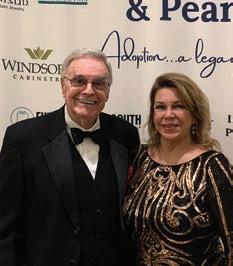
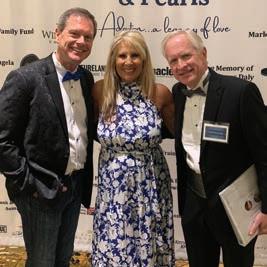
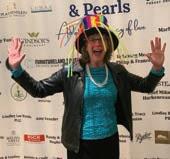
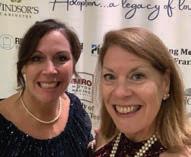




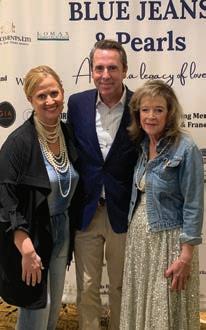

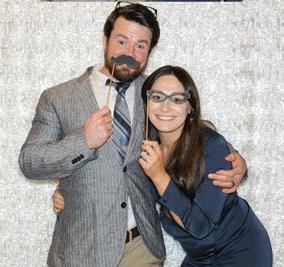
Saturday, November 19, 2022
Photographs by Angie Grimmett, Melissa Thompson & Shelli Craig
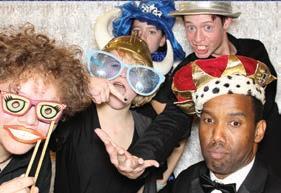

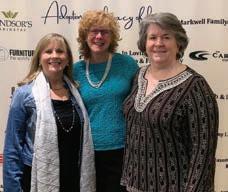

This was a term coined by her maid, Ella. Funeralizing, according to Ella, meant cooking and baking (in anticipation of drop-ins, primarily family, friends and neighbors who would come by in order to pay their respects). This required being sure there was cold chicken, iced tea and pound cake for anyone who stopped by before or after the formal service. (Funeralizing, she would explain, always makes you hungry.)
It meant earmarking ample time for the first public phase of grief — reminiscing, remembering and mourning the dead with all of those drop-ins. Which required, too, being sure your best (black, navy or gray) funeral clothes were cleaned and prepared, and the home was readied “to receive.”
And, of course, funeralizing included wearing your bravest face at the wake, plus standing at the funeral home in the “receiving line” with the family as mourners wept and made the loss their own.
We funeralized first when Ella died, and we followed suit with Fola.
Fola McClellan Williams, born in 1904, was the youngest child in a Scotch-Irish family in Union County. Her sisters became homemakers. Her brothers, businessmen. But Fola, with strawberry blonde hair and bright blue eyes, was a child of the modern age. She was a Flapper.
Fola dressed and danced prettily. She was the first woman in Monroe to drive a car. She deliberately married late and was childless. Fola shunned health fads and cooked “with seasonings,” a term for the liberal use of fatback and salt in a pot of greens or beans.
She became a buyer for Belk at the original Monroe department store. Fola took the train to New York City for buying trips, with hat and gloves — plus a tiny salt shaker tucked into an alligator purse. Unconstrained by traditional housewifery, thanks to Ella, she became president of the Business and Professional Women’s Club, and traveled.
Fola was a consummate lady, but cussed under her breath if the occasion demanded. It was her lifelong habit to enjoy a happy hour, and neighbors and friends often joined her. Upon her death, Fola relegated her worldly goods to the women in the family. Among other things, I inherited her souvenir shot glasses (including one depicting the World Trade Center, and another which looks like a thimble, engraved with “Just a Thimble Full”).
At her funeral, no less than John Belk, son of Belk founder William Henry Belk, was one of five men to eulogize her. Fola’s elderly Baptist minister dramatically cleared his throat before describing her as “a feminist.” He entreated God to overlook this aspect of an otherwise God-fearing woman, pointing out that “she wasn’t obnoxious about it.”
As the minister helpfully warned God, “Watch out for Fola in Heaven, for she has her own ideas about things,” one of my sisters grabbed my kneecap and hissed. Our mother refused to look at us, keeping her eyes fixed upon a spray of pink flowers. The rheumy-eyed minister had been partly right. Fola was a woman who had her own ideas. She volunteered for good causes, was a town booster and was unapologetically progressive.
The speakers at her funeral were also right. Our aunt was an anomaly:
Fola resided in her home town till death.
She didn’t think somewhere else was better than where she was — small-town, North Carolina.
She collected a gold pin from the company where she began her career 50 years earlier.
She remained with the man she finally chose to marry.

When things went wrong, Fola didn’t think it was up to somebody else to fix things; instead, she figured she was somebody, and did something.
After the eulogizing, my sisters and I accepted the tone-deaf minister’s sympathies. Although I later cussed under my breath like Fola might have done, I still murmured courteous thanks to him on the church steps.
This was funeralizing, after all. Fola would have insisted upon nothing less. OH







